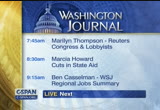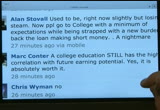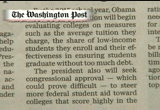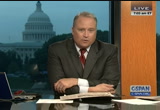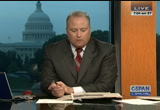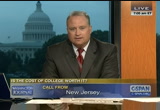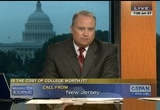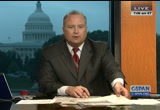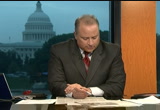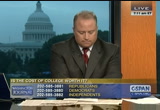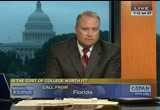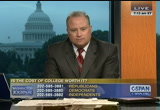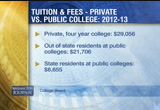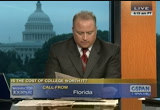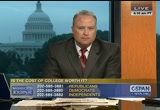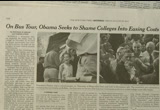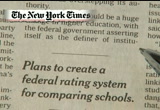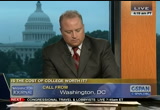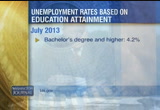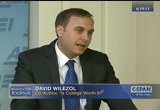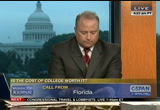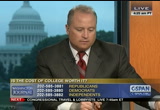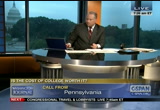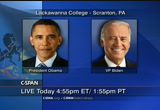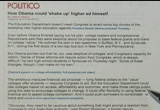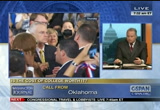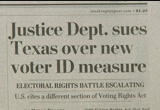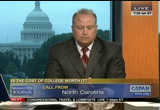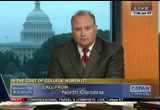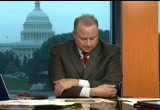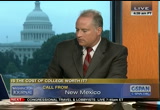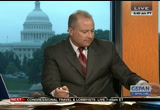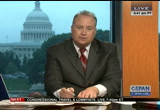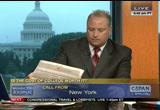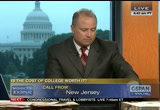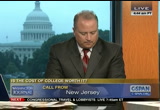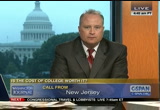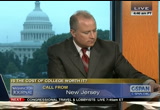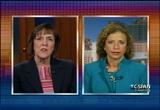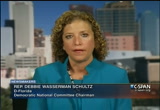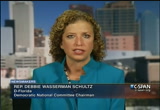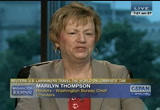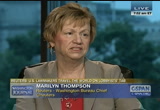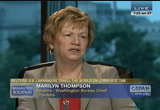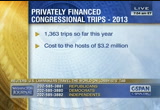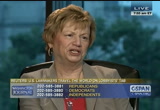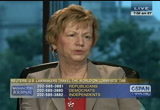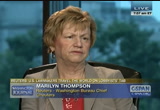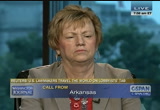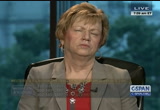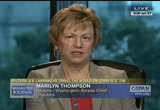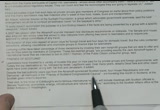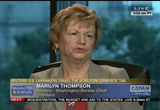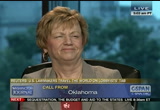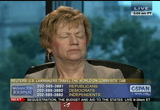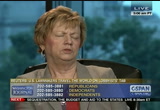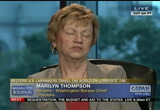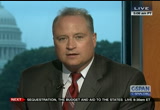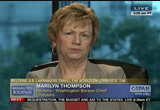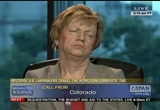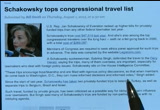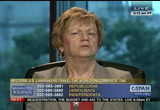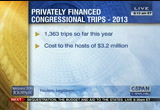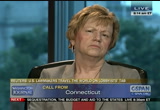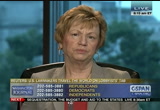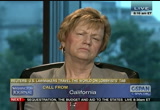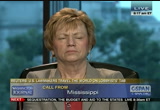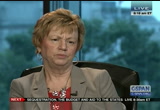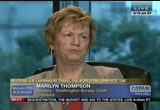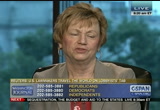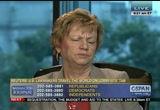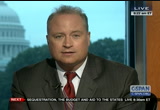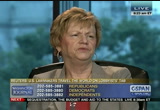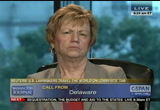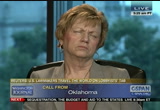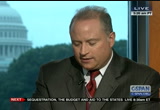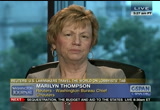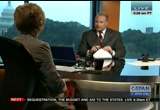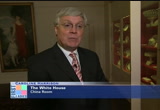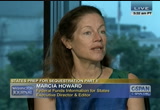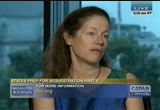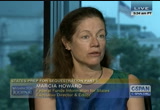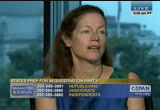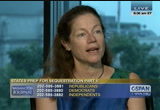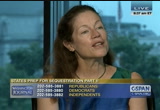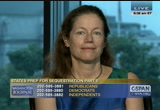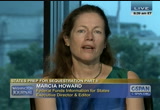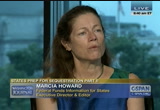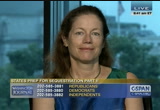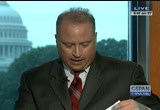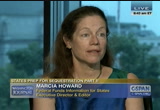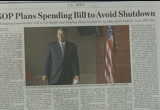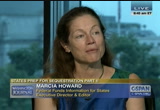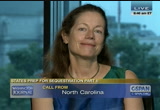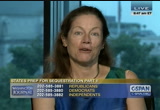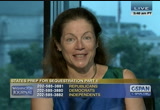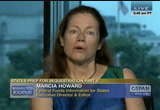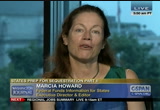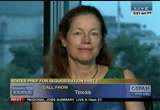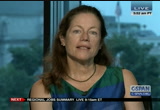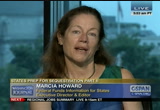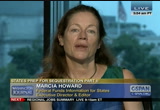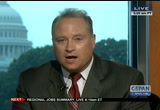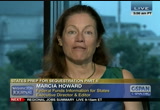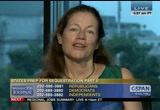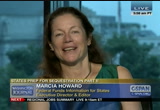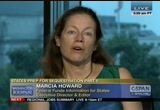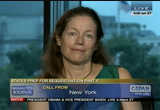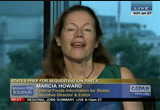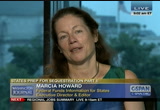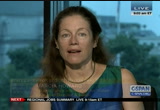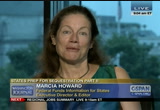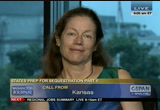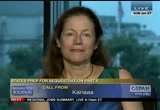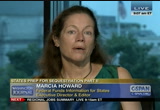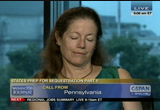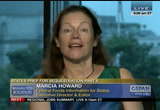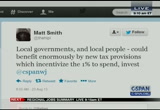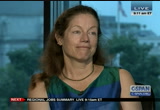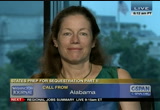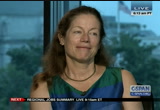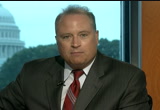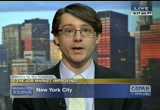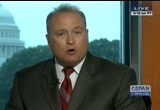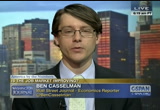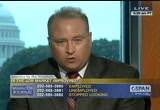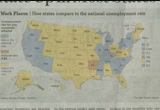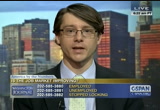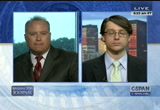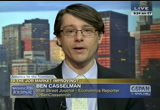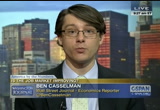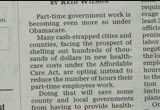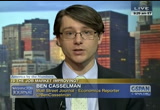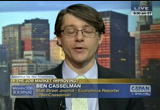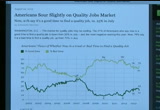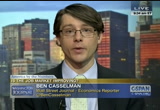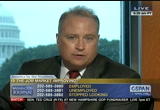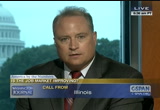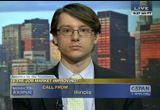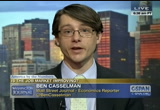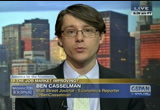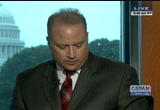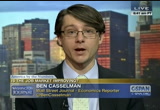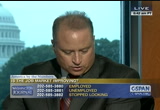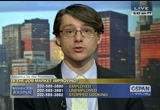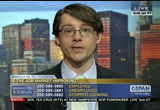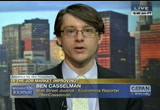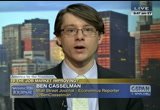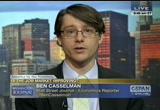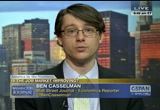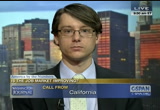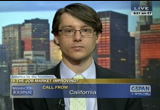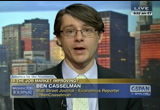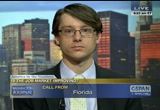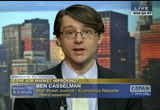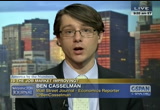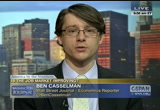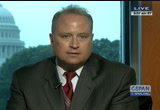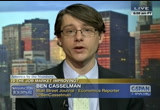tv Washington Journal CSPAN August 23, 2013 7:00am-10:01am EDT
7:00 am
which found the unemployment rate went up in 28 state and declined in eight states. "washington journal" is next. >> the president's plan to try to keep college more affordable is already getting some reaction from capitol hill. we might have to weigh in. some are in support and some are critical saying the new ranging system that the president put out is arbitrary. meantime college can cost up to $30,000 year on average now for some folks and the debt load students carrying can be the same amount. with that background is the cost of college worth it? that's the question for you this friday morning.
7:01 am
republicans call 202-585-3881, democrats 202-585-3880 and independents 202-585-3882. look forward to your calls and also your participation by social media. you can send us a tweet at twitter @c-span wj. you can also send an e-mail journal@c-span.org. is the cost of college worth it? allen writes, it used to be but right now it slightly losing steam. now people that are caught with a minimum of expectations while being strapped with a new burden of paying back the loan making short money. it's a nightmare. mark writes, college education has the highest correlation with future earning potential. little bit from the write ups
7:02 am
from the paper today. the president is on a two-day four stop tour of upstate new york and northeast pennsylvania. we'll have more coverage today. the washington post writes obama proposes a college rating system. for decades magazines have rated colleges to help families navigate the higher education market. on thursday president obama proposed that the federal government rate the nation's schools to hold them accountable for performance and help bring soaring tuition under control. by the 2015 school year, obama says his administration will begin evaluating colleges own measures such as the average tuition they charge, the share of low income students they eroll and effectiveness in ensuring students graduate without too much debt. the president will seek congressional approval which prove difficult to steer more federal aid towards colleges. student in financial need my
7:03 am
qualify for a larger pell grant. the result officials hope will be relief for families from college bill that's are three times as high as they were 30 years ago. even after adjusting for inflation. some of the figures here average tuition in fees $8600 or more. this is last year at public school. here's another number, $29,000 at private and nonprofit schools. the total annual bill counting room and board exceeds $50,000 a year at many elite schools. we'll hear from the president in a couple minutes. again, he will be in binghamton, new york to do a town hall. also in scranton, pennsylvania with vice president joe biden. two life events we'll have on c-span for you. one in the afternoon and one a little bit later in the day. little bit more from the headlines on this, here's the
7:04 am
washington time's write up. obama proposes federal controls on college cost. the funding formula will improve educational value. here are some of the reaction from congress. they write that lawmakers are set to debate and reauthorize the higher education act which is due to expire at the end of the year. congressman john klein of minnesota, a republican, agrees with mr. obama's of promoting innovation on college. saying it could stifle innovation. carol from ohio on the democratic line, carol what's the name of your town? caller: syo. host: what part of the state? caller: not too far from stuebenville? host: is it worth it? caller: yes it is. my son is a nurse and my son did music and teaching. right after 9/11 he worked 2.5
7:05 am
years in his apartment making videos for music for the schools. i have a comment. there was a poll in louisiana as a republican and 29% of them blamed president obama for the government's katrina mess. i think these people that did that are absolutely ignorant. he was just a senator not a president. host: thanks for calling. gale on the line from new jersey. gale is a republican. is the cost of college worth it? caller: well. it was about $15,000 a year 20 years agfor my -- ago for my daughter.
7:06 am
she's a nurse and she -- my husband was actually disgusted because he felt she concentrated more on the marching papers. she went to a local community college. also, i'm quite disturbed. i put myself through a business school about 40 years ago. i paid for it out of my $100 a week salary. kids can't afford cost of tuition, why should the taxpayers be paying. you go back to the academic standards of 47 years ago, most of the kids going today are not academically qualified for college. they're getting a free pass because of the social justice. the standards are so bad, i. wouldn't want my kid going to
7:07 am
school today. host: thanks for calling gale. so much of the focus is on price of college and what kind of jobs and how much money those jobs are making. joseph writes, money is important. don't get me wrong. but it's the only measure of college value is how much money you make upon graduation? here is president yesterday in buffalo, new york. >> today i'm directing arne duncan to lead an effort. right now private rankings like u.s. news and world report puts out each year their ranking and it encourages a lot of colleges to focus on ways how do we gain the numbers. it actually rewards them in some cases for raising costs. we should rate colleges based on opportunities. are they helping students from all kinds of backgrounds
7:08 am
succeed. and on outcomes, on their value to students to parents. that means metrics like how much debt does the average student leave with. how easy is it paid off. how many students graduate on time. how well do those graduates do in the workforce. the answers will help parents and students figure out how much value a college truly offers. there are schools out there who are terrific values. but there are also schools out there that have higher default rates than graduation rates. taxpayers shouldn't be subsidizing students to go to schools where the kids aren't graduating. that doesn't do anybody any good. host: the president mentioning debt there for the year 2010 and 2011 from the business insider. here's a look at debt. folks go to a public four year
7:09 am
college, $23,800 is the average debt they're carrying. private schools, four year college, $30,000. more reaction to the president's plan from the hill back to the washington time, senator chuck grassley who is a republican, said he sees areas where member of his party with work with mr. obama to control cost. he urge the president to call on colleges to limit salaries for executives. mr.grassley said the key to controlling cost is to help the consumer side of the equation. the more student and parents become savvy shoppers -- richard in pensacola, florida. go ahead. caller: i think that the president is doing a good job in trying to get the cost of tuition down in this country for our children to go to college.
7:10 am
but at the same time the colleges have to bring the cost down because if they don't and keep trying to get young people tonight -- to go to college, then they will not want to go. host: thank you for calling. in the washington post piece it says that the president's plan relies in part on his executive power to collect, manage and publish data. it is likely to draw significant criticism from colleges intent on protecting their market share and divided congress who will present immediate obstacle that will require legislation on to that last caller's point about what colleges can do, college leaders say rising tuition is the function of labor cost. in the case of public institutions declining state financial support. they note affluent students pay
7:11 am
full price. they said they is the giving consumers more -- here's a quote, we will be vigilant in working to metrics which could have a negative impact on the student and families that the administration is trying to help. tom is on the line now from ft. lauderdale, florida. caller: it's not as worth as it used to be. it's kind of a conundrum here. government is involved with the student loans and it is making opportunity better for people
7:12 am
and you don't want to kill that. on the other side, when has government ever been in involved with a large program and not mess it up and cause the cost to go higher? medicine is a primary example. if you look at the cost of medical treatment prior to medicare and then look at what happened to it when medicare came into being, the cost skyrocketed. the same thing that's going on with education. now the government is making money available. colleges want to suck that money in. the cost go up and it's really messing everything up. government needs to -- if they're going to be involved with something, they got to figure out how to do it in a
7:13 am
market way. host: let's hear from mary now from virginia. cost of college worth it? caller: the answer to that it has. some degrees, for example, licensing degrees to be a nurse, to be a c.p.a. if you go to a state college and you live in a state like west virginia, you can get a very good price. you get a very good deal. on the other hand, if you go to a priority school and you get a degree program probably not worth it because you got the same degree and you're carrying debt and i also think you're numbers for -- most of the physicians come out carrying $200,000. host: i think those numbers 238 for a public school and 30 for a private.
7:14 am
those represents average according to business insider. caller: it's very hard to know what college cost because we don't have a level playing field. how much you're eligible for is not function of you as a student and it's a function of your family. which doesn't make any sense either. host: thanks for calling. tyler writes college is a death trap. most degrees is a waste of time and money except for certain professions like medical and law. tuition and fees, private versus public college. this is last year heading into this year. the average cost $29,000. out of state residents at public colleges, $21,700 and instate residence at public colleges in their state, $8600. that from the college board. in case you were wondering about the most expensive colleges in the country, here they are
7:15 am
according to cbs news money watch. sarah lawrence college over $61,000 is the sticker price there. new york university, $59,000, harvey mud college, $38,000, columbia, new york $38,000 and wes lynn university is $58,000. michelle is on the line democratic line good morning. caller: i'm calling because i wanted to share with the country something my mother taught me in 1955 when i was five years old. she told me this, i really didn't get it at the time but since i've lost everything in the recession i must tell you i really get the idea today. i think this note should ring out through america loud and clearly. they can take carry your -- take away your house, take away all
7:16 am
of your car but they can never take away your college education. that is a bank of knowledge that not only prepares you for a job but prepares you for life. it enables you to learn how to do the basic things you need to learn to function in the country. like how to pay your taxes and how to go and do research on your own. we need to get over the concept in this country that money is our god. we need to take a look at the integrity of the people. we need to advance this dummying down of america that's occurring, that scares me terribly. i have gone from a upper class woman to a woman living below the poverty line. i still been able to work through the system because i have the knowledge that a masters degree offers me. i currently all students, i'm an educator and i taught students.
7:17 am
education is so much more than a talent or opportunity to get a job. thank you very much for listening to me. i pray for all the students in america to go get that education and cling to it. host: dan is on the line from lawrenceville, illinois a republican. is cost of college worth it these days? go ahead dan. i don't think we have dan on the lean there. the "new york times" piece has a little bit more reaction here. on bus tour obama seeks to shame colleges into easing costs. couple photos here, the president was a crowd pleaser. he also attracted a crowd at the university of buffalo first stop of a two day tour to make colleges more affordable. they point out that congress is going to have to approve the
7:18 am
plan he put out. senator marco rubio republican of florida saying i'm strongly oppose to his plan. this is a slippery slope and one that ends with a private sector giving up more of its freedom to innovate and take risks. here's tom harkin a democrat from iowa in the senate. he's chairman of the senate education committee. he's applauding the president's proposal. some higher experts question whether the administration was over stepping its authority. one more quote here. the proposal would be a huge change in higher education with the federal government asserting itself as the definer of institutional goals and policy and doing it through need-based financial aid. this is from jane wellman executive director of national association of system heads. omar on the line now from
7:19 am
washington d.c. here, a republican. caller: i wanted to say, i disagree with the lady who spoke before me about the whole knowledge you take away everything it seems nowadays -- host: keep going we're listening. caller: okay. i want to disagree what the lady said before me. they have taken away kind of everything. everyone does have a college degree and you just put -- for the most part, the younger generation does have a college degree and they're taking away a lot of our jobs out there. you leave school and you $50,000 or $60,000 in debt and it's tough to make that back. it's almost like to get a graduate degree. if you will not do that, may be you should take up a trade or be a plumber or some other
7:20 am
profession. it a little different than it was 20 or 30 years ago when you had to compete with other americans but now you have to compete on international level. host: thanks for calling omar. we do get the point. to your earlier point omar is making, we have some information on unemployment rates based on the level of education. folks who have less than a high school diploma, high school graduates 7.4%. some college or associate degree, 6.2% is the unemployment rate for folks who have a bachelors degree or higher, the current unemployment rate is 4.2% and the national unemployment rate is 7.4%. we have another piece of tape for you it's from david who was at an event. he co-authored a book called "is college worth it." this is from june. he talks about colleges
7:21 am
capitalizing on branding and what it all means. here's a look. [video clip] >> in five years we doubled the amount indebtedness with pretty bad effects. the major culprit begins with the schools themselves. they're capitalizing on a prominent social belief that to make it in the labor force as a worker as a human being, you need a college degree. it's all but essential. just speaking from experience and an anecdote is not the beginning of data. i meet people who don't have college degrees and there's a feeling not only in themselves but feeling of perception by other people if you're without a college degree, you somehow messed up in life. i think that's not a good thing. i don't think that's america.
7:22 am
so schools can raise prices to capture students who can pay full price. the very top schools harvard, princeton and yale, they will have a huge amount of demand who will go so they can jack up the prices and people will pay that and the brand is synonymous with achievement in american leaf. what has happened a lot of second tier schools followed suit. they raised their tuition that most people can't pay. host: here's a question for you, how much are you saving. u.s.a. today has this snapshot. how much do you save month physicaller your child's college? here are the numbers. less than $100 a month about a third of us, 34% are saferring less than a hundred dollars a month. another 23% say 100 to $200.
7:23 am
14%, $200 to $300 a month. 23% saving $300 or more per month. compare that with the costs out there. bob is in boca rotan a democrat. caller: i heard bernard educated himself reading obe a park bench. i do wish i had every penny i spent in college in the bank today. i went to college in the 1970 1970 -- 1970's. host: how did college work out for you? caller: i was going to say, think for below average student, i think that there's better choices than straight colleges. perhaps trade school, may be
7:24 am
even mindful parents to send children -- graduates of high school maybe to teach english around the world and get that kind of experience, travel around the world. tad too young for a freshman age college person to be traveling. there's other kinds of education and the four year degree. i think the prices today really -- i would think long and hard before i spent that kind of money. host: bob back to twitter. end tenure and teacher union. colleges spending tax dollars and tuition to build extravagant work out centers. joyce writes we need to look at the individual needs and meet the real needs. we over looked the desires and strengths of our students and over emphasize the usefulness of
7:25 am
college. elizabeth writes college is worth it. diana writes i would have to say with college education reaching $1 trillion referring to the cumulative debt of college. sound like a ripoff. frank is on the line from new castle, pennsylvania. caller: good morning. in so far as the education whether college is worth it or not. depends on your perspective. if it is to become a well educated person in our society, so the amount of money you spent for tuition you can buy a lot of books. if you're self-motivated you can get a well rounded education that way. in so far as dealing with it from the monetary point of view, it's been my experience, let me purpose this comment with this, i have a graduate degree. my wife has a graduate degree, one of my children has a doctorate degree and another child has a bachelors degree. now the one with the graduate
7:26 am
degree, he's a computer scientists at google. he does quite well. unfortunately, not everybody is like that. i submit that if anyone is thinking about going to college simply because they like the social aspects of going to a top 10 school because it has a good football team, they have a good social activities there, that's a real high price to pay. unfortunately many of the children today going to school, they don't have a good goal. they go to college with an more fuss kind of thought process. that's unfortunate because when they leave, they might go into a field that there's no jobs and consequently, it's really a waste of money. unfortunately in our society in the past when i graduated from
7:27 am
high school, you could find a job working in a mill or some other place and you could raise a family. those jobs are all gone now. so the children by default today, they go to college because they have no other outlet in order to raise a family and to make a future for themselves. because all the jobs have been exported. host: thanks for calling frank. here's little bit more from the president yesterday. >> we want all the stakeholders in higher education, students, parents, businesses college administrators professors, to work with secretary duncan on this process and over the next few months he's going to host a series of public forums to make sure we get these measure right. then over the next few years, we're gong to work with congress to use these ratings to change how we allocate federal aid for colleges. we are going to deliver on a promise i made last year. we're going to deliver on a
7:28 am
promise we made last year which is colleges to keep their tuition down and providing high quality education are the ones that will receive their taxpayer funding go up. it is time to stop subsidizing school that's are not producing good results and reward schools that deliver for american students and our future. host: it was buffalo and syracuse today and binghamton, new york. the president will hold a town hall meeting at the state university there. we'll have it live here on c-span, 12:45 p.m. eastern time. then he heads south to scranton, pennsylvania where he'll be at lackawanna college. the vice president will be with him. joe biden being from scranton. that's at 4:55 p.m. eastern time also on this network. politico writes how obama can
7:29 am
shake up higher education himself the education department doesn't need congress to enact some big chunks of this new agenda. even before he finish laying out his plan college leaders and congressional republicans said they were skeptical. obama pointed out too he was skeptical of congress' and colleagues capacity for reform. some of these reforms will require action from congress, which is always difficult he told high schoolers in syracuse thursday night. some of these changes i can make on my own. politico points out the financial aid proposal tieing federal dollars to the value college offers students requires congress to act. but, the education department could rate colleges based on access, affordability and outcome and make those public.
7:30 am
it could push borrows to consolidate loans and enroll in more generous replacement program. now to new york now a republican. caller: good morning. i've been listening to your show for a long time. i keep up with the news. this is an example of our government again taking data and obama making promises and continually campaigning to get young people on his side because he's not dealing with some of the major world issues out there which are very prevalent in the news such as egypt. college course are too high but then rating colleges on outcomes when the jobs aren't there, i think is paradoxical. i think that colleges should
7:31 am
have some sort of entry counseling for all students and tell them where the jobs are and where they might be. we become a part time society. i don't think that college graduates only have unemployment rate of 4%. i think there's a lot of part time jobs now. i think most of the jobs are in the scientists. colleges will be glad to grab your money and if the government wants outcome they have to create the opportunities such as obama's constantly espousing. i don't know instead of campaigning, i think that they should be doing something economically to help create jobs not just campaigning.
7:32 am
host: that was from plain view, new york. anna on the line from tulsa, observation, -- oklahoma. caller: i had to call. i've been paying attention to everything. i understand what's going on. first let me say that -- i'm not trying to be on president obama's side. it's like he can't do nothing right. if he's overseas trying to help, he's wrong for that, when he comes back over here he's wrong for that. let me stick with this college thing. for college, we've got to be smarter. we've got to quit depending on them to think for us. we living in a world where once you get that education, you got to really pick what you send your kids to school for. i changed my son's major. he went from business consultant
7:33 am
to animal science and agriculture because i did my investigation and i thought that is something that will go over into this new world. he and i both knew when he go to this college here, a hbcu, we won't be staying here. you have to travel where the jobs are. that's just the world we live in. host: iron patriots write, sure, college is worth it. sure go a half a million in debt so you can move back in with your parents. part of the new normal in obama's economy. we have about 10 more minutes for your calls but some other news out there involving the justice department. this is in the washington post and other papers, they're suing texas over a voter i.d. measure. justice is redoubling its efforts to challenge state voting law suing texas over its new voting i.d. measure. it's part of a growing show down over electoral rights. it's to counter a supreme court ruling that officials say
7:34 am
threatens the voting rights of authorities. the administration will probably take legal actions in other states including north carolina where a governor signs a voter i.d. law this month. washington post there. syria is in the news. obama officials are weighing a response to the syria assault. this is the report of chemical weapon usage. there's a split on the use of force. the "washington journal" has a similar piece in the headline here says, the u.s. is weighing plans to punish assad. they say that u.s. officials who described the military options being revised at the pentagon stress that their purpose wouldn't be so much to topple the regime but to punish
7:35 am
mr. assad. "washington journal" there. back to the college here. naoimi, good morning. caller: good morning. i will talk rather fast. i am -- i have a -- it is worth it for a college education. you may not get in dollar and cents but you see what you have done for the population and who you have brought along with you. now i am retired. my little bit of mess is only $1300 and $1700 income. i have joined the poverty rank but i am ph.d.
7:36 am
the industry has been very selfish about giving out jobs. they have cut people's jobs so we have no work. they have no income to save. it is not president obama. it is the greed in america. now, let me say this, when i went to school, which is way back when, tuition for a half semester was $144 a semester, there is greed, people are paying for their children to go for $50 to do other things. but it doesn't deal with learning, getting together for just purely a college education. now, let me say this, it is not the government that is doing it. it is we the people because we allow people who are not knowledgeable don't know what education really means, the historical philosophy behind it, why we have high schools, why there are high schools in communities of certain numbers
7:37 am
of people. they have no idea. yes, the curriculum has let people down because they have gone for the social instead of the basics. and know where we're going. yes, we've lost the value. host: that was naomi calling from north carolina there. more news today, the san diego union tribune has front page story about bob filner who is the current mayor of the city but perhaps not much longer. the council is set for a high stakes vote to force the mayor's exit. this deal with the allegations of sexual harassment they've been dealing. they point out the payment of fees is at issue. all signs points to filner resigning today. the question is how much is it going to cost taxpayers to show him the door remains. the agreement between filner and other city leaders his formal
7:38 am
resignation will be considered by the city council in closed session today. that's in the union tribune. one of the earlier callers mentioned egypt. he is one update, mubarak is removed from prison to house arrest. stoking the anger of islam u. -- islamist. here's a photo outside the hospital where the former leader is moved to. he's playing a trumpet here. arriving from prison in a medical helicopter, mr. mubarak arrived on a gurney. instead of the running suits he appeared in as an inmeat, he wore khaki pants, white shirt. that's in the "new york times" this morning.
7:39 am
john is calling from new mexico, democrat. caller: good morning c-span thank you for pronouncing my town correctly. with that last caller, i think she's wonderful. many of the points she made was to elaborate on the fact we have outsourced manufacturing capacity in the united states of america. therefore the managerial and middle class, which are your educated people, there's less need for us. i'm also optimistic. i'm very sad to hear the one caller berate the fact he wouldn't send that much on his child's education and it wasn't worth it. i don't get that defeatest mentality. the next big economic boost, the next big thing will come from the educated people who did put in the investment in college. we're not going to get out of the recession. it's been longer than everybody
7:40 am
thought it would. educating ourselves and having defeatist attitude is not worth the money. when you turn on the water faucet, the water runs in a hurry. all the jobs will come back just like the water faucet coming on. the thing is if you're not educated and not ready to step in and do the job, then you can't bring yourself and your family out of any sort of poverty. host: where in the constitution does it mention government pays for college education? "washington times" front page part of a kickoff big weekend events. they're taking in the local here. it's a shot here of reverend jesse jackson and bill cosby chatting as the mayor of d.c.
7:41 am
they're all here in town. a lot of folks will be rallying and marching and they talk about it in the weekend live section of the times. let freedom ring. this is the anniversary of the 50th anniversary of the march on washington and we will have coverage starting tomorrow for a good chunk of the day. we'll talk about it on the "washington journal" in the morning but at 9:00 as the event begins put on by the national urban league. there will be a rally and then a march through points in washington. the whole thing should run from 9:00 well into the afternoon. we'll have highlights and prime time live here on c-span. the national journal point this out regarding the march anniversary. they say for black and hispanic leaders this 50th anniversary offers not only a chance to mark the civil rights movement but also an opportunity to make a high profile push for some of their top public policy priority.
7:42 am
members of the black caucus already fighting stricter voting i.d. laws in several states. meanwhile advocates of comprehensive immigration reform that includes a path to citizenship has spent summer urging republicans to join their cause. but they remain largely at the mercy of the gop. some of the issues they'll be acting on as they march and hold their rally this weekend. big event next weng here in town featuring the president. flushing, new york, independent. caller: actually education is very important but unfortunately, very expensive. i hope there will be lot of subsidies. if you don't study you don't participate in the higher echelons of society.
7:43 am
manufacturing jobs in u.s.a. have all vanished because of some greed, corporate greed. wal-mart was one of the company that's really promoted manufacturing to be taken out of the u.s.a. it's very sad but i hope manufacturing comes back. all the people realize that made in america products are very good and last long. thank you have great day. host: troy, landing new jersey, republican. caller: good morning and thank you very much for c-span. couple points i like to know, i don't agree with some of your metrics entirely. sending your kid to a private school, they are going to leave that school with a lot of debt. could be in the range of $60,000 to $100,000. as far as unemployment goes,
7:44 am
we've got a lot of kids unemployed now and that unemployment is increasing. we have kids working with a college degree that are working at a minimum wage. subsidies that we're providing to these universities, which is a significant part of our gdp in terms of trillions of dollars, that is driving us into cost of college. that, i believe strongly, is pushing prices up. one way to combat that is to push the county college system. that two year experience is more for kids coming out of high school today.
7:45 am
which many of them aren't ready for a fur year college or college away from home. those two years are very good. i actually observed something interesting. i was at a high school asking what is the lowest ranked high school in new jersey? i observed financial courses being taught, this is a accounting one and two, they were using the exact textbook that is being used at the county college level. i looked at this book and it's an excellent book. these kids were doing very well with that text. to me, i think that we can get these kids started early in high school teaching them specific courses that will earn them employment when they leave. may be just have to do the two year college and be able to do
7:46 am
function level type of jobs in accounting such as accounts receivable and accounts payable and payroll. it's an option. whatever we can do to drive down the price of college and take that away from these large universities. i do have one concern and that one concern is that people that are able to pay for that higher level college, i think there's a signal or wave or frequency. that frequency might lead to discrimination. we might be going back to that. i don't know how as a nation how we're going to manage this college tuition. we bailed out the banks and the auto industry and we left the students on the sidelines. host: we'll take one more call.
7:47 am
anna from philadelphia, independent caller. caller: it's certainly worth it if we send their students to europe. we pay their defense budget. i'm looking at studying europe tuition fees. most anybody pays is from switzerland where it's up to $3000 a semester. most of them it's free of charge at public universities. in france for a doctorate, they pay 393 euros tuition a year. we have to look at this. we're being repped off in this country. thank you for your time. host: i appreciate all your calls. we will take a short timeout and switch gears. tell you about the up coming guest. marilyn thompson is coming next of reuters. the topek -- the topic will be travel by u.s. lawmakers on the tap of lobbyist. later on the program, marcia
7:48 am
howard will be along from the federal funds information for states organization. the topic there will be states preparing for sequestration. and while we bring on our first guests, we will hear from congresswoman debbie wasserman shultz which is the chair of the democratic national committee. she spoke with us from arizona where the d.n.c. is meeting today. she talks here for a couple minutes about identifying key events in the next sex months that -- six months. here's a look. >> any events as you look out over the next say six months, that you think are really going to kind of set the template for next year's election? >> i think you identified immigration reform, that's certainly going to be a critical issue. continuing the direction that we go when it comes to our policy
7:49 am
on the economy. democrats under president obama's leadership are focused on job creation, focused on trying to continue to get this economy turned around, pushing to a place with sequester and balanced eapproach to deficit reduction. where we make targeting spending cuts rather than taking the hatch off. that's the agenda that the republicans have embraced. if they continue down the path of extremist through the fall and next year, what i think is going to happen it's going to be give us more opportunities to expand the map and win congressional races that no one is predicting we have a chance to win. that's why we're doing everything we can in the democratic party to aggressiving on map expansion.
7:50 am
that's why we're in arizona for our d.n.c. meeting. after this i will be go to texas for the next few days where there's been huge demographic shift a lot of unregistered hispanic citizen and get them registered and out to vote we know will support democratic candidates because they embrace our agenda and reject the alienation and extremism of the republicans. we're looking to turn states reliable red and purple and eventually blue. that's what american voters will have a choice between. they'll continue to choose democrats and we're going to have a lot of opportunities for success. folks want to rebuild the middle class. that's what we're all about. >> "washington journal" continues. host: joining us now marilyn
7:51 am
thompson washington bureau chief for routers. the topic is the travel u.s. lawmakers. our guest editing a piece written by richard cowen. the headline says u.s. lawmakers travel the world on lobbyists tab. here's the piece. the beginning of it, lawmakers are once again taking ta advantage -- advantage of their summer recess to finance tours to places like china, middle east. tell us more. guest: for those of us been in washington for many years, this is like one of the issues that just won't go away. the whole lobbyist funding of trips for members surfaced in a big way back in the jack abramoff scandal 2006 when it
7:52 am
became obvious that he was using travel to lavish destinations and events to essentially bribe lawmakers and a number of people went to jail over that. the house and senate both realize they have a serious problem and went to work to try to make reforms. they created some new rules, no doubt about that, made it little tougher, needed preapproval, needed to go through ethics reviews. but they left a loophole that has been seized upon by a number of groups with special interests. if you were a group with interest before congress, you could set up a nonprofit entity that had very similar interest and they can pay for the travel. that's what's been happening. that's what we've seen over the past few years as a trend and a
7:53 am
growing with ethic groups which say nothing really changed here. it's the same people. host: you're focusing on this big loophole. how is it initially put into place? when all of that happened back then, the headline said they are trying to reform. how did the big loophole come about? guest: it was done in the committees, the house committee had a very rigorous review of the rules and brought in outside experts for consultations. they said it was just too hard to draw the distinctions between what the nonprofit -- what a legitimate nonprofit would be and what one wouldn't be. they divide a number of rules about the nonprofit boards. it was okay to have lobbyist on the nonprofit boards of these things as long as they're making
7:54 am
the real call about which members got to go on the trip. it's a mess. host: let me put the phone numbers on the screen for marilyn thompson. the topic here is lawmakers traveling the world financed by lobbyist. here are the numbers, republicans call 202-585-3881, democrats 202-585-3880 and independents 202-585-3882. let's bring this up the present day. little bit of perspective out there. in 2013, according to reuters. there have been trips so far this year and the cost to host $3.2 million. give us more perspective on those numbers. guest: they have created a database it's really fun in
7:55 am
viewers are interested going on and looking around. you can go on and do all kinds of sorting about the cost per trip, the top destination and these numbers give you your first real substantive window into how pervasive this stuff is. yes, we're on track to have a very big year of travel this year. this after all the hoopla that we've had in recent years about ethics. host: what does all of this mean? we're going to hear from callers shortly and you can imagine some of the folks are feeling about all of this. why is this such a big deal? guest: well, there are a lot of jokes you could make about this. they've all been made in my office and probably every office in washington. you've had a congress that has essentially been having very great difficulty functioning this year and the thought they're using their breaks to go
7:56 am
on lavish paid trips for rest, it's kind of comical. host: is there anything considered legitimate travel? guest: yes, you can certainly make the case that this travel is legitimate. they make that case. if you take a week long trip to israel on the freebie route of going through the israeli nonprofit, then you're going to have to some official functions. some of those are going to be newsworthy. they're going to meet with president perez, they do that every year. you're going to have opportunities for a lot of fun and fancy meals, nice hotels, jumps into the sea of galilee which is what happened in 2011 with one of the members.
7:57 am
it can be a combination of fun and nonwork. host: couple other quick questions. who in congress taking these trips? house, senate, rank and file. is it everybody? guest: its a pretty broad swath of members. the israeli group has been very proud of the fact that they take over a large percentage of the members from both sides. this year i forget the exact numbers, they took over big delegation of democrats led my steny hoyer and then they took a delegation of republican members with eric cantor leading. they got a lot of coverage in the press over in jerusalem. host: one more question, what other groups most active in this area? guest: well, there are a number
7:58 am
of -- great trip paid for by china from the congressional black caucus. there was a notable trip a couple years ago by conservation nonprofit that took members on a trip to preserves in south africa. there are a lot of them. host: let's get the calls going here. dustin is up fort smith, arizona, independent. caller: my question was, i've never understood how lobbyist came to be because i believe that elected representatives should fill that role. but my question to the point is, how is any kind of travel like we're talking about ever justified legally by lobbyist to members of congress? guest: well, that's a good question and they certainly wrestled with that in these various committee reviews and a
7:59 am
number of -- a lot of members when criminal cases have been brought against members over the past 10 years, there will be an element of this somewhere buried in the details of the cases. it's dicey. i think all members know it's dicey. they've tried to create a lot of safeguards that will make it look better but to the general public, it doesn't look any better. host: george calling from ocala, florida from the republican line. caller: ms. thompson, i was wondering if there were other corporations such as nonprofit corporations, only thing i can think the aarp or move on or any of these big multimillion dollar
8:00 am
corporations considered nonprofit that are also lobbying the congress. i think president grant started to lobby wasn't it in the lobby of the hotel in washington d.c. just to answer the other man's question. whenever we talk about lobbying, we always think of private corporations. no one ever realizes it's a advocacy industry. am i correct in assuming it? guest: you're absolutely correct. it is a giant industry and it is the industry at the heart of washington d.c. .....
8:01 am
8:02 am
anything you want to add to that? chico that is an interest -- guest: that is an interesting example because rick found out about the scottish trip through word-of-mouth in our news operation. when he first started making calls about it, nobody wanted to fess up. it took a while to pin down the details. it was getting some publicity in scotland that these members were about to come over and they had visits to universities and a festival, but nobody wanted to talk about it on capitol hill, at least at first.
8:03 am
host: 10 members, the piece says, the congressional black caucus visited china. this is the piece by reuters. more of your calls in a moment, but from twitter, some perspective -- we are worried about $3 million of travel by congress and the president spent $100 million to vacation -- vacation is the word he uses -- in africa. oklahoma. caller: hi. i think we can take all of this money they are using for travel and put it toward the education fund. host: interesting point there. from acadia, illinois.
8:04 am
illinois., that e-mail still my under. i see the value in learning about other cultures. i am sure your newspaper has a lobbyist. , want to know about reuters picturesu publish fake from the middle east. host: what are these phony pictures you are talking about? doctored photos of iran missiles making them look more menacing than they were. they were phony. they published issues of palestinian children. these were fake photos. host: let's get a response.
8:05 am
guest: i cannot comment about the picture decisions made by reuters. we are a huge global news organization with people in virtually every country in the world and the photo department is an entity that i have absolutely nothing to do with. host: our guest is the washington bureau chief for reuters. she is marilyn thompson, talking about the u.s. lawmakers travel at the expense of lobbyists. she was previously at "the new at "thees," an editor l.a. times," and joined writers after 17 years -- joint reuters after 17 years at "the washington post." boring fileter from clerk -- where does the money come to send nonprofits?
8:06 am
raise moneyofits from all sorts of sources, including generous people, and i am assuming that is where they come up with the funds. it is an entity set up legally and they take money from contributors. moneyone other tweet -- and politics is a dangerous combination -- i understand lobbying is needed, but how is this not constituted as a bribe ?- bribe slope.it is a slippery host: how does it work with answering questions about what the taxpayer might be getting from this? guest: the rules of the senate and the house have been used up in recent years.
8:07 am
there is a pre-notification process. if you get invited to go on a trip, you are supposed to notify the committees for approval at least 30 days in advance. when you get back from the trip, you are required to file expense reports. they become public information and that is the data that was drawn from to create this database. host: who have been the leading voices in congress currently or in recent years? guest: i have not heard a lot of major voices on this issue. i think that, certainly, the ethics committee officials have been, perhaps, the most vocal about how much they are trying to reform things. if you go back to 2011. there is not a lot of talk about it asubject -- "let's keep
8:08 am
little under the wraps." host: ryan, massachusetts. independent caller. caller: i want to know, are the members of congress being taxed by the irs for these gifts? guest: i do not know the specific answer to that because i am not a tax expert. host: why do you ask? caller: if they are getting money from special interests or lobbyists, why are they not paying a gift tax? guest: i do not know. i do not feel qualified to answer that. host: grace. tuscaloosa, alabama. have two quick questions. one is about the political connections for some of these
8:09 am
groups supporting the travel. for example, aarp is almost a political advocacy group for president obama and his administration. i think another group was mentioned that is more or less the same. the other question i want to asked just to back up the message about the president's travel. taxpayers are paying the president's travel. guest: we have written about the president's travel. this particular story was not about that. carol lynn at "the washington post," who is an amazing investigative reporter, and did the first story about the outrageous cost of the resident's -- president's africa trip, and somehow got a hold of the behind the scenes memo about what would be required to take
8:10 am
him over there and the secret service protection that would be required in these remote places. it was an amazing story, and it did get wide pickup from all u.s. media. the white house scaled back a little on those plans after that story ran, but it still was a asy, very expensive trip, all of his strips are expensive because of security concerns. is on the line from colorado springs. independent. caller: i am curious as to why you do not name names. it would have more effect. with racism -- they say the guy is white -- if he is irish, say he is irish. if the senators name is john doe, say it is john doe. the more specific than saying it
8:11 am
8:12 am
just one example there. byron. cleveland, tennessee. thank you for waiting. caller: good morning. i would like to asked marilyn thompson about the congressional black office trip into china. the reason i am asking this is because they are a progressive group, and i have been reading party, usa, and they call themselves progressives also. i would like to know what is this a progressive group has going to china because that does not seem right. thank you. guest: i would only say -- i do , you know, what political reason there was isegoing -- but china
8:13 am
certainly a huge u.s. trade partner. there are all kinds of interest back and forth with companies and business. you certainly could find a legitimate reason to want to go to china to want to look into interestsest there -- there. china also, as all of us in washington know, they are really on a charm offensive to try to improve their image in washington, and i have a feeling that was part of what we were seeing with this trip. host: earlier we showed you the figures for current travel -- 1163 trips so far this year, and the cost being $3.2 million, from legistorm. the piece in reuters has more on the same theme.
8:14 am
2000, 200,000 -- 2000 11 trips have been taken. for marilynng thompson from hartford, connecticut. independent. caller: i was wondering what marilyn thompson's opinion is about the formation of a consumer group to oversee lobbying and these trips specifically. a consumer group formed by voters rather than by congress -- is there any mechanism to do that, does she know, and how would that be done? i would say there is certainly a way to do that. there are new groups springing
8:15 am
up all the time that have watchdog functions here in washington. i cannot tell you how valuable that is to the process. you know, we rely on not just groups like this legistorm, but groups like the sunlight foundation. there are many, many of them already operating here in washington, and when they decide to take on a specific issue, like aggression of travel, or anything else -- congressional travel or anything else like office expenses on the hill, they do an amazing job in both getting records at the public can then review, and consolidating that information into something that you can use and do stories from. they are great for journalists. so, there is a way for that to spring up.
8:16 am
host: the opinion of one other viewer is this on this topic -- "with today's technology, there is little need to actually travel to these countries. if they want to travel, let them pay for it. from loscalling alamos, california. welcome to the program here at what would you like to say -- program. what would you like to say? caller: what i would like to ask is with this incredible amount of money they are spending -- i run the center for human out to raisee go money to help everyday people, and when i see these amounts of money being paid out -- $100 million for one trip, it almost makes me ill. so, i think the money could be spent much better. you know, i understand security and stuff, but maybe they need
8:17 am
to cut down onir trips and they need to focus more here in the united states rather than a broad. host: thank you for calling. reaction? guest: it is certainly a valid point. host: let's try charles from mississippi. republican line. hi, there. caller: my question to the lady would be that i noticed during this family vacation with the president's family was gone to martha's vineyard, they left bo the dog at home, and sent a marine helicopter to bring it back at a cost of over $300,000. i would like to know why that is not talked about more. host: more about the president there.
8:18 am
guest: i do not know where the facts are coming from, but i find that intriguing, and if that is true, that is certainly something reuters would want to know about and write about. i have a long record in journalism looking into the -- exactly that kind of thing. i will take that note home with me. host: a couple of callers are mentioning the white house, and twitter, the same thing. we have been talking about rules congress wrote for itself for travel. you have a sense of how the white house works in this area -- how he decides where they are going? is anyone oversee those decisions because we are hearing it from callers? guest: i do not know the full answers. it would make for interesting inquiry by rick or any other journalist. carolyn "--s
8:19 am
carolyn's story about africa goes, it is stunning. for the costunning of journalists who have to travel with the president. that is a growing issue in the news community. we have to send reporters with him everywhere he goes. it is a draining proposition. host: what has changed in recent years in that area where, i guess, everybody can not go. are they pulling resources more than they used to? how does it work in the journalist community? resources, and certain news organizations like reuters and the associated press have made a commitment that they would do it all, and the prices
8:20 am
seem to go up exorbitantly over and over. host: we have 10 minutes left in the segment. kevin is calling from brooklyn, new york. democrat. caller: hello. , couldoing to ask somebody give me the difference between bribery and lobbying. host: i gather you think there is no difference, right? caller: the only difference i see is writing is done in the dark, -- bribing is done in the dark and lobbying is done in the light. guest: there are certain legal sanctions between bribery and lobbying. often involves the exchange of money with a specific agreement that something will be done that would not have been done otherwise. i mean, it it is a criminal
8:21 am
offense. earlier, is i said the essence of what goes on in washington. it is trying to get your members to do something for you or your group, and the range of companies and interests that are doing lobbying in this city grows by the day. host: when we talk about members going places on the lobbyists' tab, what about members families? guest: they go with them many times. you will take your wife or maybe a child. those are common. legistorm also has that. host: do the members pay any portion of these trips?guest: i think that varies is. i have not researched that enough to tell you, but legistorm also has that on family travel.
8:22 am
host: mark, st. paul, minnesota. democratic caller. caller: all the presidents in the past have taken vacations, and i am pretty sure they are , but i costly as obama's am wondering why he stands out more when he takes vacation than the other presidents. host: why do you think? caller: i think it is more of a republican ploy to try to make this president look bad for history books. he is the first black president that has taken office, and i think republicans -- host: thank you. let's go to florida. ernesto. commenti wanted to about the trip for the dog to martha's vineyard.
8:23 am
it makes it seem like it was only done for the dog, but they had the office workers and they just happened to have the dog being that they were going to make that trip anyway. when you leave stuff out, it is not nice. host: any questions for our guests? caller: none. i just wanted to comment. from another comment twitter -- unless can use skype or go to meeting -- less trouble for congress, no travel for congress. does congress review this process on a regular basis? how does the work to see how the current set of rules and laws is working? ethicsi am assuming the committees, having imposed these guidelines, are keeping a handle on it. it will be interesting to see
8:24 am
whether stories like rick's piece have impacts on getting one member to step forward and say "hey, that loophole that is being taken advantage of by everyone needs to be addressed until we have not heard that yet. -- addressed her cope we're not heard that -- addressed." host: rehoboth beach. caller: i wish there were more press coverage about the huge amount of dollars being spent by the democrats. it is over the top, out of this world. it is the european aristocracy of 200 years ago come to our country. host: let's hear from our guest. guest: i do not know what to say to that. athave to rigorously look
8:25 am
all of these expenditures to see if they're out of control. host: sherry. oklahoma city. democrat. hi, there. caller: i am just absolutely inquiryt this constant about the president's travel and the cost -- why that is such a bone of contention. it is almost like c-span has become a place where people come to have a klan rally. it is only because this president is black that they have such concerns about the cost of his travels. other presidents have traveled. nobody is ever complained and accused george bush of being a socialist or all of these ugly things because of his job.
8:26 am
of course, he being the first black president, he is going to need a lot of security, just evident by the racism. it is amazing. host: we understand the point. anything about congressional travel and the theme here? caller: i think there should be some kind of oversight and there should be some limit, but i am more concerned with the lobbyists like the koch brothers and monsanto and these other private corporations that are getting congress to write laws that protect them and allow them free reign and to control everything. host: back to the oversight and setting limits comment -- should that apply to residential travel as well -- presidential travel as well?
8:27 am
caller: i think he and all presidents do have oversight. they have to comply with requirements of congress. he can only do what he is allowed to do, not just obama, but all presidents. this cherry picking about who is the bad person and who is not is so suspicious, and it has to be because of race. host: cherry picking their, based on race -- more about the president's travel. guest: for those of us that have been in the business for a long ite, presidential travel -- is not the first time it has been a focus of inquiry by journalists and outside groups. i can remember stories about kennebunkport -- why in the world to presidents like bill clinton always go to martha's
8:28 am
vineyard, and are they paying proper price for the houses they rent. these issues have been explored in every administration i have seen here in washington since the 1980's. host: we will take one or two more calls and wrap things up. randy. kentucky. you are on the line. caller: thank you. i am calling about these lobbyists. i think they ought to be outlawed, for one. it is just rivalry, if -- bribery if you think about it. they are paying off politicians, putting money in their pockets for what they're goal is, not the people's goal. host: time for one final thought from our guest -- is there an aspect that we have not talked about that you want to bring up -- anything else we should know? guest: not really. it has been good to hear the
8:29 am
opinions from the real world and about the presidential segment as well. host: maybe it is a pc can do in the future -- residential travel. marilyn thompson, thank you for your time and insight this morning. we will change out guest and deal with a separate, brand-new topic in a moment. us to howard will join talk about the fact that congress has until october 1 to make a deal to avoid the next round of sequestration cuts. look at how these planned cuts could impact federal funding. ther, we look at whether job market is really improving -- what are the details around the country. we will be right back. ♪
8:30 am
>> i do not want to see the loss of journalism. i am frustrated when i see the loss of so much state and local journalism covering what is happening in city council and on the ground because the national journalism is not there if you do not have local journalism. a lot of what i do is watching, and reading local stories to see what is happening at that level. if there are not people on the ground doing that world, -- worked, i think national journalism's eddie's -- suffers quite a bit. i hope somebody figures out a way to keep that sustainable and keep those people in place. we will see more in social media where people do not go to the
8:31 am
websites of news outlets quite as much, but they see stories being shared by others, what their friends are talking about, and news goes that way. >> from a blogger to a managing editor at "the washington post," amanda terkel on what is shaping journalism on c-span "q&a." >> on the encore presentation of "first ladies" -- >> she saw that it was rather dirty and she tried to spruce it up. she found old pieces of china and asked servants if anyone ever how old this was, so she started to catalogue and create a sense of what they were.
8:32 am
she had a plan of putting display cases in the state dining room. i never came to fruition -- that never came to fruition or she is credited with being the initiator of a permanent china collection at the white house. >> the encore of our original series "first ladies," continues tonight on c-span. " continues.journal host: our guest is marcia howard, who is the executive director and editor of a group called federal funds information for states. tell us what your group does. guest: we track federal funds for states, the simple answer. most states get 25% to 30% of all the funds they get federally. they do a great job analyzing what happens in the state legislature, but what happens in washington is harder for them to keep track of.
8:33 am
rather than have them do that 50 times over, we are a national organization that can do it once on behalf of all 50 of them. host: you mentioned so much money comes from the federal government into the state, so the obvious question is with sequestration, what has been the impact on the states? guest: even before sequestration, states would seem reductions in a lot of grant programs as times get tougher in washington. i say that having experienced a huge increase in federal funds in 2009 when the recovery act was passed. that was a big infusion. since then, there has been a little bit of cut back here and there. that has accelerated with the budget control act. that said, the largest amount of money states receive from the federal government is in the form of medicaid, which has been largely exempt from any of these budget cuts, so, states overall have not seen large decreases,
8:34 am
but they have seen decreases in several of the smaller grant programs. host: tell us what else is exempt. guest: mandatory spending in general is typically exempt -- not all of it, but a lot of it. things like food stamps, temporary assistance for needy families -- those things are exempt. also exempt from the budget control act sequestration procedures is highway spending and transit spending, a big area of spending accounting for some $50 billion or so a year. host: on the nonexempt list, what is on their in the most part and what is the impact that? -- impact then? guest: the major impact is in education. when we talk about no child the time, it consists of dozens of grant programs, all subject to sequestration. in addition, community
8:35 am
development and housing programs -- many of the programs that slow down to local governments are covered by sequestration. also covered are interior programs -- environment programs, labor programs. marciaur guest is howard, federal funds information for states. she is editor and director. there is the website. what would folks find their? guest: they would see a listing of the various reports we have put out. we track the federal budget process. we track when congress is reauthorizing legislation, such as it is now with no child left behind. we track competitive grants. there is a listing of stuff -- pretty geeky stuff. host: the phone numbers are on the screen for our guest if you
8:36 am
want to understand more about the federal dollars, how they go to the state. separate lines for republicans, democrats and independents. preparing forare further sequestration activity. explain what is coming -- what are the states facing? guest: the big problem is states do not know what they are facing. the biggest complaints we hear is what are the states going to do, can they afford it? what we hear is mostly not about the magnitude of the impact, but the uncertainty of the situation. here we are with just a month left in the fiscal year and congress has not enacted a 2014, and fiscal year states, because federal funds are such a large portion of what they spend, they need to plan their budgets and they cannot do that because they do not know what resources will be available to them.
8:37 am
what do governors and state legislatures and agencies do in this time of uncertainty? how do they plan for it? guest: they turn to us and say what are they going to do? a report thatt tracks about 90% of the grant funding they receive and we make assumptions -- what if congress comes back in a couple of weeks and decides to enact a continuing resolution to begin fiscal year 2014, as it has been in almost every year i have been doing this kind of work? if it comes back and it adopts a continuing resolution and that continuing resolution adheres to the budget control act, what kind of cuts, what kind of funding levels are we likely to see, and we give states these estimates knowing that more than likely they are not correct because congress has one million variations on what they can do and it is almost certain to do something other than what we
8:38 am
assume, but it gives them a sense of the magnitude of what is likely to happen as the fiscal year gets underway and progresses. host: our first call for marcia howard. james. assisted be. independent -- mississippi. independent caller. caller: i am glad you are talking about this. the program dealing with a certain part of the government as far as multi family housing and section eight programs -- we know for a fact that the federal government sends these grants to these places, and the printed -- conditions are persistent. the funds means sent in this -- being sent -- when you have people living in the situations and the conditions are worse, the funds are not being appropriated the right way.
8:39 am
when you have people like myself speak out about it and you go back to the federal government and the federal government does an investigation and they do not see a problem with the way the money is being appropriated, but we have evidence now of over i companies, that deal with section eight and multi family housing -- you have about 20 apartment complex owners being re-modified. we are saying how can that be? if all these 20 complexes are tong redone, what happened the money that was supposedly being used at the time? host: let's hear from marcia howard. guest: the section eight programs are those that are subject to sequestration. to the extent that you might at the local level feel those programs are underfunded, chances are that situation could get worse before it gets better under the current budget control
8:40 am
act that will be with us until it1 or until congress amends , which given the current environment, does not seem imminent. host: laura writes on twitter -- states should just plan on not getting the money. what can states do -- when we talk about exempt versus non- ,xtent -- nonexempt programs can money be moved around from account to account? guest: that is one of the issues we saw. alternately, congress provided flexibility, and everybody remembers the screeners at the airport, the tsa, they gave flexibility so that they would not have to furlough those workers. it varies by agency. four states, when they get money in a particular brand, they are somewhat limited. they have some flexibility to move funds around, but you could not move funds from the
8:41 am
department of education to the department of housing. you cannot do those kinds of transfers. host: really. callow -- lily. california. democrat. caller: good morning. support all, i sequestration, but i want to implement it completely. i do not want any exemptions, none. readjustedat they for the airports. if we have three or four planes falling out of the air, fine, but we should out everything. let's shut the government down, period. i pay $600 a month in rent, and i figure if we crash the stock market, i can buy apple stock for nothing. i was sleepy and my car but i will have apple stock and other stocks, so i am looking forward to having this economy crash
8:42 am
them completely crashed, so that people suffer and cannot get food or anything. that is what i am hoping for. i am praying. let's stop everything. host: thank you. interesting comment there. guest: thank you for your call. i have not heard that particular position very often. there certainly are people that feel the sequestration, the exemptions, have made it unfair in certain ways because some programs get cut and some do not, but in general there seems to be some evidence that this bill is doing what it intended to do. it is bringing down the federal budget deficit, it does exempt, certainly, a large number of programs. numbers -- anthe overview of sequestration, according to the group led by our guest, federal funds information for states -- the sequestration cut $984 billion ,rom the current year budget
8:43 am
2013 through 2021. what else should we know about those numbers and those lists? guest: well, let's see. ways, imbers, in some do not want to say they overstate the impact of sequestration, one of the things this bill did in capping spending is a took federal spending and took what is known as the baseline -- what do we need this year, next year, the year after that, to do what we
8:44 am
, and thoseight now numbers, of course, go up every year because salaries go up, utilities cost go up, rent goes up, inputs go up, so costs go -- it shaves the growth, not reducing it, but allowing it to grow a little bit each year. it is an important point because it means the cuts are not as severe when compared to last year's actual spending, but severely when compared to the baseline that would be allowed and that is growing. host: speaking of a shutdown or not, "the wall street journal" has this piece. there is a shot of speaker john is crafting a strategy that could avert a showdown by differing the
8:45 am
toughest budget issues to later in the fall. what does that mean? guest: that is what we thought would happen and when i read about john boehner's proposal, what he wants to do is put together a continuing resolution cap.adheres to the budget that is the analysis we did for the states. that is what the house of representatives is talking about, but the differences the house of representatives will probably enact a short-term resolution, weeks or months, that is their preference. the senate would like a continuing resolution that carries into next year, and the reason is the debate over raising the debt limit. the debt limit will be hit, apparently, sometime later this fall. the house would like to use that tod to raise the debt limit revisit the whole budget issue
8:46 am
and strategy and wrap all of those things up into one with healthcare thrown in there as well. the senate and the white house would prefer the debt limit be raised without any other generations. they feel it is an important issue and it should stand on its own. so, the question is how will that happen when the debt limit comes up, and chances are he will have the debt limit tied up with fiscal year 2014 appropriations, tied up with the budget control act and obamacare all at once at the end of the year -- sounds familiar. salem,calvin from winston- north carolina. independent. caller: good morning. team to c-span and your for giving us information to make an informed decision. two questions -- i teach a grant-writing class in community the state ofughout north carolina, and i talk about
8:47 am
how grants are available on the federal level and how grants trickle down to the state level. i think the question was answered in one of the slides, but the question is how come overall, will grant the impacted by the sequestration threat and previous sequestration threat in terms of the federal grants available and the trickle down effect to the states. -- states? secondly, remind us how the --uestration deal started was it started in the house, the senate, the white house? fingers are pointing everywhere, but i cannot remember who proposed sequestration and how it was adopted. host: thank you, calvin. do you want to take a crack at that? guest: excellent questions. grants, they are competitive. you apply for them. you get the funding or you do not. budgete covered by the control act, sequestration and
8:48 am
reductions. last year, those programs, on average, saw about a 5% cut in funding levels because of sequestration. on, we have run the numbers embedding sequestration into a continuing resolution this year and we found that while sequestration would reduce domestic spending just a little bit more than 4%, for grant programs, it would not be quite so bad. many grant programs would probably see something close to level funding compared to what they got this year, and in some cases a slight increase. yes, sequestration does affect competitive grant programs. they are seeing those impact. as to how this all got started, it was in august of 2011, and surprisingly enough, it was around the debate to raise the federal debt limit. if you go back and can recall those times, you might recall
8:49 am
there was talk of a government shutdown and what would happen, and it was a crisis-filled atmosphere and it was because nothing becomes law without everybody agreeing to it, something the house, senate and white house negotiated to get the budget reductions in ways to get the debt limit increase at that time. so, what we are headed into now in the late fall is similar where the debt limit is again coming up for debate and, once again, it will be the catalyst for these major negotiations on the federal budget. host: here is a tweet for marcia howard -- did the gop offer bills to let agencies control their budgets? guest: i am not sure about the answer to that question. in the house, there were some proposals to allow states to have more flexibility and federal agencies to have more flexibility.
8:50 am
as i said at the front of this, there was a large degree of variance in terms of how much flexibility was exercised in implementing these. host: which states get the most federal dollars and which get the most per capita -- this e- mail. guest: another good question. whereeve mississippi is there is the most state spending. states that do well are states poorer wither -- lower incomes. when you think of mississippi, alabama, south carolina, new mexico, they do very well in the medicaid program. a state like new york, which is not a poor state, but runs a large medicaid program, also gets a large amount of federal funding per capita through medicaid. then other states that do well in the grand area tend to be area tendern -- grant
8:51 am
to be large western states. yet in general, those on the states that do well in federal grants. then the states in the northeast, the upper midwest, the industrial midwest, they tend to do less well on many of these measures. texas onnt pleasant, the line. what is your name? caller: my name is buffalo. i am a native american. i wonder why everyone goes into panic over sequestration. secondly, why do we not on the state level eliminate such a need for all of these things because, quite frankly, states are becoming dependent on the federal funds when they should be taking care of their own business. host: eliminate the need for what in particular, buffalo?
8:52 am
the federal money? caller: sure. the federal is supposed to be a backup plan for state-level needs. host: but if it makes up a ,ecent chunk of a state budget something would have to give, no? thatr: certainly, and states need to actually -- and the states need to actually work around having to use so much money from the fed. that is how i read it. i am 68 years old and i have watched this country. interesting -- host: interesting ,oint -- less federal money states have to balance their budget and get business done. can you offer perspective? guest: for many states, these are federal programs, not state programs. they are federal programs the states are implementing at the state level to make them run
8:53 am
more efficiently, effectively, so when there are federal cutbacks, the question is what will states do about that? finances have not been as robust lately as they have been in the past, many states are not in a position to backfill these federal cuts. what we see states doing, i think, in general, is trying to put away some reserve funds to the extent that they can identify them, and state revenues actually came in pretty well this last year, so some states might have a little bit aside,y they could tuck and then they evaluate the various reductions. then, they do, kind of, a triage in a way -- what are the most important areas, which are less important, which ones do we need to fill in? to some degree, when the federal cuts come through, they come through all the way and the money is not replaced and the programs are simply reduced. host: you touched on state
8:54 am
budgets -- they are doing better and what is the projection for the years to come? guest: states did better in fiscal year 2013, and the reason for that is you might recall there was a little bit of a fiscal cliff debate last december and it involved expiring tax provisions. in response to that, many people sold stocks, took capital gains and companies paid dividends. they wanted to do that last december before tax rates went up in january. when that happened, because of linkages to the federal tax code, state revenue went up because of the activity taking place in december. states ended up with a little bit of a windfall, especially incomeith progressive taxes. host: to your point about states putting money away on these rainy days --they have a good
8:55 am
history of doing that? guest: states have a good history of keeping rainy day funds well-funded. typically, states should for balances of about 5% of their general fund spending to keep tucked away. that is probably not enough for a recession like the one we just had, and to states great relief, the federal government often steps in and helps out with funding in one form or another. in general, states have been very close to that 5%, and what we noticed in this latest downturn is even as they were tapping their rainy day funds, they were not using it all up in their first year. they held off and tried to keep money in those funds so they not get completely to plead. host: we had 15, 20 minute slot with our guest, and the next call is madison, wisconsin. steve. caller: thank you for taking my call. governor, scott walker, i
8:56 am
feel, stupidly, decided not to accept program money for our medicaid, which we called badger care, and this has resulted in many poor children and families being pushed out of the program. of --o decided to get rid we were supposed to have amtrak service from here to minneapolis and then to chicago, no walkie in chicago, and he completely got rid of that -- no walkie and chicago and he completely got rid of that. you comment on these things because it gets me upset. host: let's hear from our guest. guest: thank you for the question. your governor has company. states have decided not to implement obamacare at the state exchange level. that is not happening in many places.
8:57 am
any of the high population states are trying to implement it, but a great number of states are choosing not to implement it at this time. many believe that over the long term because the federal component is so generous, 100% at the beginning, and 90% at the end, many states will find it is too good of a deal to pass up, but certainly, in the short term, any governors and state legislatures are choosing the same path your governor has chosen. with respect to amtrak funding, again, there has been federal money made available to states rail, and some states are saying we do not have the volume of traffic that could justify this over the long term. that ishis as something likely to impose costs on us that we cannot afford right now. so, again, while you might not agree with the decision, i will say other states are making the same decision. ast: our guest has worked at
8:58 am
variety of bc-based nonprofits, -- d.c.-based nonprofits. marcia howard is currently executive director and editor of federal funds information for states, ffis.org, and our next call is jim, middletown, pennsylvania. caller: good morning. guest: hi. employee,am a federal a technician, and the congress did sequestration and cut our pay. i wonder when congress is going to, instead of cutting more the people, it there wallets as well? host: not uncommon. guest: a lot of federal workers are asking the same question here is a political question and and 99 have an answer for it. -- and i do not have an answer
8:59 am
for it. rita.rita -- florida. caller: there is so much waste in the grant. i have seen it happen in state after state. host: can you speak to her point about waste in grants and how the government deals with that? guest: what i can say is the federal government is an enormous economic entity -- $1 trillion flowing from the federal government, and it flows in the forms of hundreds and hundreds of rent programs -- some small, -- grant programs, some large and some small. you could imagine what it is like to keep track of all of that. somebody that goes in and spends a good deal of time, effort and money that unit how these programs are performing is likely to find that there is some waste, and we see, certainly, over and over waste,
9:00 am
fraud and abuse as a target for how to reduce federal spending. i am sure there is plenty of that going around in the federal government. what i would also acknowledge, given the size of the enterprise, is that is not particular surprising -- particularly surprising. host: sabrina. we have a democratic caller on the line. caller: i want to talk about the democratic states we see on federal funding and always bashing the government. thathe southern states receive that -- [indiscernible] i live in new york. we are not getting over time anymore. i think it is unfair. host: you did talk about bigger states also being in a fish areas in some way. but speak about -- being in a
9:01 am
fish year ease in some way. but speak about the smaller states. guest: states with smaller personal incomes tend to receive a higher share of the funds in their budget. medicaid gives higher federal matching rates to states with lower incomes. if you look at the personal income in the united states, you will see connecticut ranks number one. it is about twice as high as mississippi which ranks number 50. as you look at the array of those states, what you notice is states in the northeast and the upper midwest and the west coast have the higher personal incomes. southeast has lower personal incomes. medicaid counts for about 40% of all the money states get in grants. it is very large. because it is structured in that way, those southern states really tend to receive more federal funds than the other
9:02 am
states, at least as a share of their total budgets. the other part of the question is really a political statement, and i do not have an answer to that part. that wouldis a tweet like more insight on the states themselves. can you decipher which states are net givers and which are net takers? she takes it a step further in terms of red and blue states. guest: there have been efforts to do that very thing over the years. the tax foundation used to put out a report annually that asked this question -- for every one dollar of taxes that a state since to washington, how much does it get back in spending? of course, and a time of federal budget deficits, the answer to that question is probably every state that since one dollar to washington gets more than one dollar back, because the federal but -- the federal government is running a budget deficit. but it is a very complicated calculation to do, and the tax foundation has not done it in several years now, about seven
9:03 am
years or so. you can go to the website taxfoundation.org and it will show you the states they got more than one dollar back for every one dollar a spend and the states that got less back. i believe new mexico may have ranked number one on that for getting the most back. and i believe new jersey, perhaps, may have ranked number 50. new jersey is close to the bottom. new mexico is close to the top. host: aside from your organization, you coming on this program, you have talked about other websites -- how else can folks find out about this , andss, sequestration bring it down to their personal level to see where this is headed? guest: it depends on what your interest is. there is stateline.org and they do a good job of reporting the impacts on the state level. there are groups devoted to
9:04 am
certain aspects of this relationship. the center on budget and policy priorities does really good work, very good analysts there are even out emitting the impact of many of the low-income programs. so for people who have a particular interest in that, that would be a good group to look to. host: fred, kentucky, republican. caller: i am a first time caller. sequester,s, on the if we were going to raise the debt ceiling, wasn't it supposed to bring down the debt of the united states, but yet it is still going up? host: looking for budget perspective there. guest: good question. it was supposed to bring down the debt level of the united states. it is doing that over the long term. but the reality is that each year the federal government is still running a budget deficit.
9:05 am
as long as there is an annual budget deficit, then that total debt level will continue to go up rather than down. the budget control act is designed to try to get this federal budget closer to balance. it does seem to be looking -- doing that. if you look at charts, you will and 2010e gap in 2009 which is quickly closing up. but there will be debt for a long time to come, probably forever. many economists will say that. but it is still an issue and needs to be raised. host: on to kansas now. you are on with marcia howard. caller: when bill clinton was in program fortarted a people that were on welfare, mothers. they had two years to get some
9:06 am
training and get off welfare. eliminated a lot of stress on the federal money coming to states. if government would do drug testing, the hair follicle tests because there are things you can take where the urine samples do not show the drugs, but you can take the hair follicles of these people who are on welfare and good food stamps -- actually, even any federal employee. i am sure we would save a lot of money because they would not have to be paying out money to people on drugs and draw social security or welfare or food stamps. because it is a big am a big ash lot of money being spent on that
9:07 am
they could be saved. the clinton bill you are referring to was welfare reform. it created temporary assistance for needy families. that program still exists in the same structure as was enacted in 1996. it does have time limits on it and work requirements. interestingly, the amount of federal funding attached to that program was frozen at that time. in the $17 billion or $18 billion range, and it has not changed over the years. as to the drug testing aspect, we have seen several states talk about that and do that. so there is a bit of a buzz around the idea of having people who are applying for public benefits to be subjected to these kinds of drug tests. host: reading, pennsylvania,
9:08 am
democratic caller. caller: thank you for taking my call. i really do appreciate c-span. two quick questions. one, where i work him a we have not had a for four years. -- we have not had a pay increase for four years. we were told that a few dared -- a few years down the road when obamacare gets rolling, because of our insurance, the type of , we're goinghave to to have something called a 40% of thex which is worth of our insurance policy, medical insurance policy. what i am wondering is -- so we will be paying a percentage of a percentagedually of the 40% of our net worth, which is about $16,000 for
9:09 am
family. in the states -- and i am from , in the states that do not participate in obamacare, will the people with the cadillac insurance have to pay that? what are you think the odds are that moody's will downgrade us again and how will that affect us? i am sure it will be negative, but thank you. guest: as to your first question, for states electing not to participate in obamacare, that election has to do with the state medicaid row graham, a public health row graham devoted to older leak disabled low- income people. so it does not have any bearing at all on the other portions of the program, including the tax on the cadillac lands you are talking about. as to a moody's downgrade, you know, it is anyone's guess at this point. i think part of the downgrade is
9:10 am
really just saying to congress and the administration, let's get this done. think, depends on how this plays out, how long it takes, how painful it is, how close to the brink. when people talk about , and makesshutdowns the rating agencies nervous. some people are talking about that. some think it is a good thing and something it is the thing to most be avoided. i think we will have to wait to see how congress conducts they negotiation when it returns from its august recess to see how the rating agencies respond to that. host: on twitter -- local governments and local people could benefit enormously by new tax provisions which incentivize the 1% to spend and invest. your thoughts on that? of tax provisions do try to incentivize that. one of the areas of budget
9:11 am
reduction and deficit reduction that has been discussed a lot is the idea of getting rid of some of these tax preferences. it turns out that the revenue lost from the tax preferences is actually as much as the federal government spends on the stuff that it spends. so there are a lot of these programs in place that do give people tax breaks for engaging in some activity or another. there is certainly a divide as to whether there should be more of those or fewer of those. part of the debate around tax reform has been the notion of getting rid of some of these preferences, many of which are targeted at that 1%. host: another tweet -- didn't obama illuminate welfare to work, and if so, how much has welfare increased as a result? guest: no, he did not. host: mary from florida, democrat. caller: hi, i have a question. and have money left over
9:12 am
the governor, scott, he took the money and paid the taxes for people. but when the newspaper called up to find out who he paid taxes for, he refused to tell them. i will more thing -- no, let you just do that one. actually not sure i understand the question of whose taxes he paid. i am sorry, i just do not understand the question. host: william from alabama, republican. correcti would like to you on something. you are not telling the truth about work requirements. obama illuminate it those. as far -- obama e many did those. as far as sequestration, that was obama's idea. you know it and you are sitting there lying. that is all you are is a damn liar. host: no, let's see if you have
9:13 am
a final thought on all of this. thought, working for states, the message i think states would like to deliver and washington is that the uncertainty around this makes it difficult for states to plan their budgets and rent their budgets in their states. as much as some of these cuts hurt specific programs, states are on board with the notion of contributing to helping the federal budget get back toward balance. more than anything, they would just like to know what kind of resources they are going to have to work with if this program remains in effect and asked congress to make that part of their job a build it easier. federalrcia howard, funds information for states. the website is ffis.org. thank you for your time and all the information this morning. one more segment in this friday edition of the "washington
9:14 am
journal yuriko we will talk about the jobs market when we come back. and some information on whether it really is improving. ben casselman is with the wall street journal, and he will be joining us from new york. be right back. haverly on, we said we this 16 acre piece of land and we have to put some things on it, or maybe not. it was open ended. what can we do with it? everyone wanted a say in that could quickly, leaders promised the public process to receive public input to generate a master plan. at the same time that that was going on, however, like i said before, you had larry silverstein, the developer who owned the lease for the office space, you had the port authority, and they believed in
9:15 am
the importance of the commercial space that was destroyed. they wanted to make sure that lower manhattan and remained an international hub. so they had to rebuild all of the commercial space. >> the controversy over rebuilding on the site of the world trade center. the battle for ground zero, sunday night at 9:00, part of book tv this weekend on c-span2. >> let's begin with a well-known american novelist, one of our best writers, james baldwin. what got you into washington? >> i could say the fact that i was born a negro in this country. more completely, i felt there was no way for me not to be mostved with what is the significant, the most important, the most loaded demonstration to free americans that has ever happened in this country. recently, likey
9:16 am
most americans, i expressed my support of civil rights largely by talking about it at cocktail parties, i am afraid. again, like many americans this pay only can no longer lip service to a cause that was so urgently right and in a time that is so urgently now. >> sunday, american history tv marks the 50th anniversary of the march on washington with historic and contemporary roundtable discussions, archival films, visit to the national portrait gallery, a theater performance on the 19 -- on the civil rights movement him and firsthand accounts of the day. >> "washington journal" continues. host: america by the numbers now , we're looking at the job market and asking the question of whether it really is improving. it depends on what you read
9:17 am
these days. our guest rights for the "wall street journal." he is joining us from new york city. he is ben casselman, an economics reporter for the journal. good morning, sir. guest: good morning. recent piecen't from you that says how much is the job market really improving -- we have a recent piece from you. what have you found out? your: it depends on perspective. the job market is improving but not anywhere close to as quickly as purdue much anybody would like to see. it is not improving for everybody at the same rate. a lot of people are getting left behind in this recovery. there are parts of the country that have not seen the same kinds of improvements. yes, we are adding jobs but not anywhere close to the pace that anybody would like to see. host: what do the recent numbers look like? guest: the unemployment rate has come down to 7.4% nationally.
9:18 am
10%.is down from a peak of we have added about 6 million jobs in the recovery. to put that in perspective, we lost about 8 million jobs in the recession, which was a massive blow. we have gained back about 6 million of those, but that leaves 2 million jobs that we have not recovered. and the population has grown along the way. if we continue to grow at the rate that we have grown recently, it would take seven years to get back to pre- recession levels of employment if you adjust for population growth. that is a pretty brutally long recovery. host: there is the jobless figure but also the figure about salaries, pay, income. you have recently written a story. pay isdline says -- low clouding job growth. can you explain? guest: this is a very serious issue and one that a lot of
9:19 am
people intuitively understand. we do not have as many jobs as we would like it we are also not adding as many good jobs as we would like her last month when the jobs report came out, more than half of the jobs that we saw came from the retail sector and the restaurant sec or. these are traditionally low- paying jobs. over the course of the last year, those have accounted for about a third of all jobs growth, which is much higher than their share of the overall economy. so a blot of the jobs being created are low-paying jobs -- so a lot of the jobs being created are low-paying jobs. some of them are part-time and temporary jobs. so these jobs do a broad-based recovery. manufacturing was an area that grew pretty significantly in the early stages of the recovery and really has not grown very much recently. you have seen cutbacks in government jobs. the construction industry has been very slow to rebound. some of the sort of jobs that we think of as really being core
9:20 am
good middle-class jobs have been much slower to rebound. the question becomes -- is that a long-term trend or a short- term trend? i think the jury is out on that. . there is some reason to think that we usually see these kinds of lower end jobs is the first to come back. as the economy rebounds, we will start to see more of the good jobs coming behind them. there are certainly some economists and a lot of people who are just worried that we lost a lot of these middle-class jobs and that we are creating -- maybe some jobs at the top of the spectrum and at the bottom of the spectrum but not so many in the middle. host: we will do the phone lines differently for this segment. ben casselman is joining us from new york city. if you currently have a job, here is your number --202-585- 3880. if you're unemployed --202-585- 3881. effusively just stopped looking for a job, would like to hear about your situation as well -- if you just simply stopped
9:21 am
looking for a job -- 202-585- 3882. and everyone else has a separate line, 202-585-3883. , is aest, ben casselman graduate of columbia university. he is spent time in the wall street journal dallas bureau. he has written for the weekend section of the journal on residential real estate. he is currently economics reporter. in your paper, there is a recent map they came out. the headline talks about the jobless rate up in most states. begin with the colors. if you look at the national rate, it is 7.4%. states in the blue are states above the national rate. these are states in the eastern third of the country and also toward the west coast and on the coast. this huge area in the middle, the yellow, means they are below
9:22 am
the national rate. can you give us more perspective? is quite a bitre of regional variation across the country. it is interesting, there is a variation both and where unemployment is higher and lower. there is also variation in terms of who is seeing more and less improvement. the coasts have typically been worse in this recovery. if you look at the middle of the country, the plains states -- north dakota has the nation's lowest unemployment rate at 3%. very well.a is doing you get down to the state of texas, their unemployment rate is 6.5% now. oil has been a major part of their story. agriculture has been pretty strong in the middle of the country, too. these are states that do not see the kind of huge run-up in home prices and therefore do not see the huge collapse in home
9:23 am
prices. once you getvada and californiae other side of the country and into florida, these places saw the real housing bubbles and have seen a collapse and have been trying to recover. call, huntington beach, california. go ahead. ask your would like to view on what basically it --butes to the job losses basically a tributes to the job losses, and what do you think would improve the job rates? host: give us a little bit of recent history on how the unemployment rate first started going up and perhaps with the trends are for the future. to bothhe simple answer is the economy. we saw a massive recession, the worst since the great depression
9:24 am
, from 2007 to 2009. for the job market it lasted really into the start of 2010. jobs were lost across the country, across industries. it reached a lot of populations that have not suffered as much in other my older recent recessions. it hit a lot of college graduates. it hit a lot of middle-class workers, middle-aged workers, kind of the core of the labor force. a lot of them suffered much more in this recession than they had in the past. and the economy has very slow to recover. the really disturbing thing in some ways is that, by some measures, the job market has actually recovered better than might be expected given how the economic growth has been peered we sort of think about this as a jobless recovery. in some ways, what it really is recovery.eryless we have not seen strong economic
9:25 am
growth. as a result, we have not seen jobs. if you separate out why people lose their jobs and become laid off, in order to get back into the economy they have to be hired again. layoffs are back down to pre- recession levels. we are not seeing any significant number of layoffs. it is kind of at the normal level. so we are not losing jobs. but we're not seeing hiring. we had nothing hiring pickup anywhere near the degree that we have seen layoffs come down. so we are not breaking into this core of unemployed workers. we are not putting them back to work. that has been what is holding things back. host: deborah calling from indiana. caller: i have a bachelors unemployedi was for quite a while. i have full-time employment now. ime $9.25 an hour.
9:26 am
with that, that is hard to make ends meet. dd jobs.e on o doing dishes, tarring roofs. there are jobs that are not easy. the reason why layoffs are older -- lower is because offices say i have no work for you. operations,d pop and the employee goes on because they are not working full time to begin with. that not counted as a layoff. host: let's get a perspective from ben casselman of the "wall street journal." absolutely is something we hear all across the country. because the job market is so weak, people who have bachelors
9:27 am
degrees and solid work histories are being forced to take jobs they would not take in a normal economy. they are working for $9.25 an hour like the caller. they're working in part-time jobs and lower skilled jobs. that pushes down the job opportunities for people who used to do these kinds of jobs. i did a story this week that teen employment. we tend to worry less about teenagers than adults. but teenagers have been pushed down to the bottom of the job market. if you are an employer, why would you hire a teenager if you can hire somebody with experience, a 20-something, or in some cases people in their 50's and 60's who have retired and are coming back into the job market? this is part of why we need to be concerned about this job quality question. not create the
9:28 am
strong middle class jobs, then everybody gets pushed down. people and up doing lower end jobs. those people who do those jobs get pushed out of the jobs market entirely. the pche headline to just mentioned -- making the point that low-income and minority youths are disproportionately hit. there is a piece talking about part-time workers this morning and the "washington post." it says part-time government work is becoming even more so under obamacare -- they point out many cash-strapped cities and counties are in the prospect of shelling out hundreds of thousands of dollars in new healthcare costs. anymore perspective on that? guest: i think that is something people have been watching very
9:29 am
closely. to some extent, the anecdotes are ahead of the evidence. that is not to say that this is not something that we really will see. but if you look at the data, part-time jobs as a share of all jobs rose pretty sharply in the recession. more and more jobs became part- time. it has kind of gradually come down in the recovery, but they remain well above where they were historically. something like 80% of jobs are full-time. 20% are part-time. the share that is part-time is above historical norms, but it above massively historical norms. a lot of the jobs that were like retail sectors and restaurants, often part-time jobs. to some extent, the increase in part-time employment made be more about where we are adding the jobs rather than somebody shifting towards part-time work. we have heard a lot of anecdotal evidence that companies are at
9:30 am
least considering, and in some cases are shifting towards part- time employment, so they are not required to provide healthcare benefits. -- that has not shown up in the data yet. i would hesitate to conclude that it is at that level. we may will see that happen as we get closer to the deadline. tweet that is a says, "we keep talking about the recession as if it was in the past. given the job market, can we honestly say that it is?" what are we calling this current phase, state, situation we are in right now, ben casselman? guest: it's a question i hear a lot. wem an economic perspective, tend to look at perceptions around the number of indicators. by the official talk to lists of the economists, the recession ended in june, 2009 -- the
9:31 am
word of the economists, the recession ended in june, 2009. we are not growing at the pace we need to see. we are recovering, not with any kind of speed that we would like to see, the kind of speed that would put lots of people back to work and put them back to work in those kinds of good jobs. it's a little bit of semantic point. if you don't feel like the economy is recovering, you are not wrong about that. it is not recovering quickly. , it a technical standpoint is no longer a recession. talking about a poll from gallup about the mood of the job market. currently, 21% say it is a good time to find a quality job versus 25% in july.
9:32 am
we have christopher on from buffalo, new york. good morning. caller: good morning. i'm a 55-year-old male. on disability. life.ed 35 years of my never collected a check of unemployment in my life. jobsd two jobs to three through the 35 years, always to at a time -- always two at a time. i am on disability. god was nice enough to give me a stroke, almost killed me, and let me survive. because iorking again do not make enough on disability still to sustain life. and they are talking about cutting food stamps and stuff like that that i need to
9:33 am
survive. i'm sorry. let the rich start paying their fair share and let them start creating jobs. and when it comes to part-time labor, i worked in the restaurant business for 20 years . i worked the union factory job in the printing industry for 30 years. and i did building maintenance for seven. out of that time, i have seen the factory work go from full- not employees to companies wanting to hire full-time employees and going to a temp agency to fill flats. host: thanks for calling. any reaction?
9:34 am
mean, i think the caller hits on a few different points. one is the manufacturing economy -- it is absolutely true -- was crushed by this recession. it has seen a little bit of a rebound, but not a very strong one. that continues a long-running decline. something like 8% of all u.s. jobs are now manufacturing jobs. we think about manufacturing jobs as better jobs. they do tend to be better jobs. a lot of the new hires tend to be at lower levels. a lot of contracts have been renegotiated. people who come in now do not make as much as the longer-term, union workers who have been there longer. even the better jobs are not necessarily as good jobs as they once were. we are also hearing a lot of people who lost jobs in the recession who ended up going on unemployment benefits and that have now run out. we have seen in employment benefits expire for millions of people. -- we have seen unemployment
9:35 am
benefits expire for millions of people. the benefits have become less generous overtime. states have been cutting back out of concern for their state budget. a lot of people are being left with very few options. it's difficult to find a job out there. there are still about three unemployed workers for every posted job opening. an improvement from the recession when there were more than six. but it is still very tough out there for the unemployed. if you're having trouble finding a job, we are seeing people end up on disability benefits, on food stamps. we are seeing a lot of young people moving back in with their parents. we see a lot of people needing to scrape to get by in this economy. host: we have a caller on the line from illinois. explain your situation, if you can. caller: ok. i've been unemployed for more than 20 years.
9:36 am
i two college degrees in electrical engineering and social psychology and no one will hire me. i try and try. i quit trying more than 10 years ago. i have worked part-time jobs. i've tried starting a business. that did not work out in the 1990 past. no one will -- in the 1990's. no one will hire me. if you look at it, if you've been out of work for more than five years, were not interested, don't bother applying. i'm living off of a very low income that i saved up when i was working many years ago and on some money that i got when my parents died. i'm living in their home, otherwise i would be homeless. i'm just not looking for work because i know they're not going to hire me. host: question for our guest? caller: i don't really have a question. i don't think there's anything he or anyone can do. let me tell you one other thing. about these so-called free jobs for everyone --
9:37 am
i remember reading in a book in the 1990's that, even in good , professional workers, people with college degrees, there are usually somewhere whoeen 500 and 1000 people are applicants for everyone job that is available. that is in good times. people lookingn for blue work, i'm sure it's worse. work, i'm sure it's worse. people looking for unemployed and benefits, let me tell you the story that happened. when i got unemployed, i filed for unemployment. they told me i did not "qualify." they told me to go to welfare. they told me that i "did not qualify." so i went to try to get food stamps. they said, you can get food stamps unless you are on welfare. i tried to get help paying my bills. they said you cannot get that unless you're on welfare. , reducedget lifeline
9:38 am
telephone calls. they said you have to have food stamps and welfare before you qualify. one question coming out of that -- he mentioned a degree in electrical engineering, generally considered a good one in terms of job prospects. are you surprised about the trouble he has had? well, i think he hits on something that is a real issue out there, this score jump -- of long-termcourge unemployment. 4.2 million have been out of work for six months or more. that sixn i focus on months is because there has been quite a bit of economic research that shows once you've been out of work for six months, you become much less likely to get a job. there are a number of explanations to one piece seems to be that employers really look at that gap on your resume and just will not hire you. we have heard explicit cases where companies will say no
9:39 am
unemployed need apply for this job. there are lots of cases that are less explicit about that. i recently saw a study that was done by an economist, a graduate student at northeastern university, who sent out model resumes, mock resumes to jobs around the country that differed only in how long the gap of unemployment was on their resume . as soon as people hit six months of unemployment, they stopped getting calls back. what we are seeing is, for whatever set of reasons, employers are really skeptical about looking at somebody who has been out of work for a while. that makes it very difficult to get back into the job market. one of the things that we saw early in the recession was -- we did not know it was going to be this bad. a lot of the experts, the people who work with the unemployed on the ground, would tell people, .et this pass
9:40 am
don't take the first thing that comes along. take this as an opportunity to find a better job. when the economy turns around, we will find you something. that turned out to be, for this particular cycle, terrible advice. a lot of people having knowledge that it has not worked out. the economy did not turn around quickly. those people went from being short unemployed, where they might get a job, to being long- term unemployed, where they are going to have an extremely difficult time, as we've seen from the research. many of those people have been left behind, especially people who are a little bit older and also young people, many of whom don't have much work experience and are now having a very difficult time getting their career started. host: more of the headlines from around the country. another source in the "washington post." in the atlanta paper this
9:41 am
morning, private hiring boosts the area there. the metro jobless rate falls, but applicants are still far outnumbered -- still far outnumbered out -- still far outnumber openings. we've been talking about the federal government. state and local governments, how are they doing echo -- doing? a little are seeing bit of good news. state and local governments were hit hard by the recession because of the collapse in property tax revenues and the collapse in income tax and sales tax revenues to gas tax revenues fell, they were forced to cut budgets and cut jobs. the federal government stepped in to some extent early on, providing a backstop. what we have seen is that start to reverse as the federal government pulls back. state and local hiring has picked up a little bit recently.
9:42 am
it certainly is nowhere back to where it was before the recession, but it is looking a little bit stronger. they are no longer hemorrhaging jobs. they are no longer a major drag. but the federal government is kind of taking up the slack. they are cutting jobs. we may see more of that with the sequester and some of the other .udget discussions going on the government sector as a whole remains a drag on the job market . the state and local piece of that is looking a little better. that's an encouraging sign. teachers are a major source of employment. those can be good jobs. police and fire. a lot of government workers at the local level are pretty good jobs. it is certainly something that is encouraging. host: in the wall street journal," -- "wall street the fed edges closer to the target.
9:43 am
at 7.0%, that is where the thatal -- "journal" writes is where the fed expects to be -- there is another number. 6.5% is the fed threshold for starting a conversation about raising rates. can you speak more to that? guest: the fed has been a major source of focus recently. the fed has this will mandate -- this dual mandate. they want to try to keep prices steady and they want to try to encourage full employment. we are obviously not there right now. the fed has taken some extraordinary measures to try to boost the economy. the two most notable pieces of that are that they have cut interest rates to nearly zero percent. because they met -- cannot cut them below zero, they started this bond buying program known as quantitative easing.
9:44 am
they set the targets at which they are going to start to revisit those programs. the first of those is the seven percent target -- the 7% target. that's where they hope to have ended quantitative easing by, more or less. were getting pretty close to that. 7.4%.ally, it is we may get down to 7% by the end of the year or early in the new year. there has been a lot of speculation that the fed might start to pull back its bond buying program in september, at the september meeting coming up. the fed has been very clear they will be watching the data. they are not looking only at the unemployment rate. they're looking at a lot of different indicators to there's a lot of betting going on on wall street about when the fed will start to do that. there is another piece of this. they said they don't expect to start to raise interest rates until the unemployment rate drops to 6.5%. they may not even do it right away then if inflation remains in check and if the job market
9:45 am
is still healing. they may hold back. this is a major area of focus at a time when we are seeing -- we are learning who president obama will nominate as the new fed chair. term endsemain key's at the end of the year. endsairman bernanke's term at the end of the year. there has been a lot of focus on who might succeed him. host: you are up in new york city. we watched candidates debate earlier this week. how is that area doing these days. -- days? the new york state is doing better than new york city as far as the unemployment rate is concerned. in new york city, the unemployment rate is still above 8%. the rest of the state is below 7%. new york, there has been a lot of focus on the good jobs question here as well.
9:46 am
there are a lot of very, very good jobs in new york, down on wall street, but there has also been a lot of growth at the bottom end. we have seen some activity here recently, as well as elsewhere in the country, from fast food workers pushing for higher wages . that is something that has gotten a lot of attention. it is not clear how much of an impact that will necessarily have. there has clearly been a growing anger, i think it is safe to say , or at least a growing concern about this good job question. strikes of fast food workers spirit we have seen protests. we have seen some pushes around the country -- we have seen strikes by fast food workers. we have seen protests. we have seen some pushes around the country -- a gives the sense that people out there feel there is this issue of job quality. one cents of that -- one theseof that is
9:47 am
minimum-wage jobs which might have been held by teenagers or people trying to work our time are now being held by people trying to support families. that's a pretty different conversation than finding some pocket money to buy books or to have a little bit of spending money during the school year. if you're trying to support her family, it's pretty difficult on these kinds of wages. tweetthere is this following up on everything we've talked about so far. "do you think that this is basically the new normal for the job market?" is this just as good as it is going to get? guest: i think anyways that is the big question -- i think in many ways that is the big question on the job piece. there is research that suggests the kind of jobs that get created early in the recovery tend to be these lower and jobs end jobs. if demand starts to pick up for your business. if you are a factory, you might
9:48 am
be able to squeeze a little bit more out of your existing workers before you go ahead and try to hire somebody else. your productivity goes up before you start adding workers. if you are a restaurant, there are probably only so many tables that a waiter or waitress can handle. if you see more customers coming in, you actually have to hire another waiter or waitress. it is fairly common to see those first.f jobs come back there have been a lot of the barbell effect, that we have more good jobs than bad jobs, less -- good jobs and bad jobs and less in the middle. that might be driven by globalization, competition from overseas, by automation from more and more jobs being done by robots, by computer programs, depending on the type of job for talking about.
9:49 am
i don't think there's anything close to consensus among economists. i think it is worth noting that we had been worried about jobless recoveries before him even in the 1990's. in the recession in the early-90 's, we heard about a jobless recovery and we saw one of the strongest labor markets in a generation in the middle of the 1990's. we sometimes get into this pattern of saying it will always be like it is now and it is not always like it is now. things can improve. whole ismy as a probably on stronger footing than it has been. people got out of some of the debt from the recession. the banks and corporations are in better places. a be the building blocks are there -- maybe the building blocks are there to start stronger growth. but we've heard that before. i think a lot of people are justifiably skeptical about it because it seems like we are year things-- next
9:50 am
are going to be better. when it does not get better next year, i think people are a little bit cautious. host: back to the phones now. it is howard from california. good morning. caller: good morning. tank you very much for taking my call. thank you for c-span. discussion -- the time when the federal reserve begins and whatinterest rates effect and just how that would work on our debt payment as far as interest -- projected.n debt and the low amount of interest and paying on the national debt --
9:51 am
to 4.5% or 5% or 5.5%, what effect would that economy iur -- on the read -- on the economy. i read the "wall street journal." i recommend it strongly. it gives you great detail, from business to politics. it's a great paper. i also read the "los angeles times." and "the press enterprise" here in riverside county. if you could address that. keep up the good work. i enjoy the "wall street journal" and recommend it strongly. host: thanks, howard. mr. casselman. guest: thank you for rating.
9:52 am
were happy to have -- for reading. we are happy to have readers and people who do what you do. about not say too much interest rates and the government. i will say that the reason the fed will increase rates at a certain point is because economic growth is picking up and that is driving down unemployment and potentially driving up inflation. if economic growth is picking up, then that will also increase tax revenue and should make it easier for the government to make its payment. it is not like interest rates are likely to go up in the absence of that. it is clearly something the fed is paying close attention to. it is something people in washington are paying close attention to. it is worth noting that deficits have gotten quite a bit smaller recently. so, theget cuts and
9:53 am
situation is not what we sometimes perceive it to be of the ever-expanding government. host: keith is on the line from florida. welcome. caller: thanks for answering our questions. just on a personal note, before you come back on tv, grow a mustache. you sound so knowledgeable on this. you must have been a child prodigy. i have two questions. one is on baby boomers. one is on the weekly unemployment figures. with 10,000 80 boomers retiring a day, that is 300,000 a month -- 10,000 baby boomers retiring a day, that is 300,000 a month, you mentioned some are retiring and quitting their jobs. are they staying with their jobs instead of -- what are happening to those jobs? on the weekly unemployment numbers, i listen to them every thursday, are they newly applied unemployment workers -- weekly about 300,000. that is like 1200 jobs a month
9:54 am
that are lost. out ofever going to get this mess? the numbers really don't match up for me. host: two different points there. go ahead, mr. casselman. take the second one first, we have to keep in mind the economy is really large. that's a little bit of a silly thing to say, i guess. but we have 140 million jobs in this country. some of those are getting cut all the time. others are being created. we hear every month that we added 200,000 jobs, we lost 100,000 jobs. the reality is, in any given month, we create around 6 million jobs and cut around 6 million jobs. the 200,000 number is a very different -- narrow difference between the two of them. it is true that we have new
9:55 am
unemployment claims come in every week, get announced. those have come down to about the level they were before the recession. these are kind of getting down to this sort of normal level of layoffs that could happen in any economy. what we have not seen, as i alluded to earlier, is the hiring take up -- to pick up. if you lose your job, it's still a lot harder to get a new one then it would have been in a better economy or hopefully it will be when the economy turns around. as far as the baby boomers, it is absolutely true. if you look at the share of the population that is working, for every single group, it has fallen over the course of this period, with one exception, and that is people over 55. people are absolutely staying in the workforce longer. they are working in higher numbers. some of that is a longer-term trend, people are healthier longer. they are choosing to work longer . some of that is about the way
9:56 am
the pension system works. it's a lot harder to retire at 65 if you don't have a reliable the pension. people are choosing to work. some of it is almost certainly that the economy is still not good. people are nervous about leaving it behind. their retirement savings may have been wiped out. they are still trying to rebuild them. aboutay be nervous getting back into the job market if they need to. so, people are sticking around longer. that does have this pushing-down affect we have been talking about -- pushing-down effect we have been talking about. --ple in their 50's and sit 60's are not stepping away from the job market, and that leaves fewer opportunities for those at the bottom appeared there is an amazing statistic we cited in a story this week -- for those at the bottom. there is an amazing statistic we cited in a story this week. oryou think of a 16-year-old 17-year-old boy a decade ago, he was twice as likely to work as his grandfather, his 70-year-old
9:57 am
to 74-year-old grandfather am adjust on a statistical basis -- 74-year-old grandfather, just on a statistical basis. 10 years later, the grandfather is more likely to be working than his teenage grandson. we have seen this remarkable shift. some of this is about the retraction -- the recession. some of us -- this is this remarkable shift. they are entering the workouts -- workforce later and sticking around later. we have people starting their early 20's and staying till their 60's, rather than what they would have seen with people starting in their teens and leading by their 50's to early- 60's. -- leaving by their 50's to early 60's. host: we will take one more call. is -- my comment the government bought gm with taxpayer money. that anse of it, is in
9:58 am
taxpayer-owned business? and if that is him how come we did not demand that the jobs -- and if that is, how come we did not demand that the jobs that were outsourced come back to america question mark the other america?is -- back to my other question is how come we don't reform the unemployment program to people being given the money upfront, rather than -- tell thoseen people that, instead of taking unemployment, take the money and go start a business? host: let's hear from our guest. gmst: just quickly on the point, it is notable that michigan had the highest unemployment rate in the recession. but it has seen quite a bit better of a recovery than somewhere like nevada. there unemployment rate is now under 9%, not good, but somewhat
9:59 am
better. there has been a rebound in auto industry or whatever you want to attribute that to. on the unemployment benefits, it's an interesting point. a lot of economists would argue that we ought to try to experiment a little bit more with our unemployment benefit system. that it is not necessarily very well-designed to encourage people in the best possible way to find jobs. it is not necessarily designed to encourage them to take advantage of that time to get training, to develop skills that will help them get better jobs later. some countries have experimented a little bit more. denmark is often cited as a country that has done pretty well in terms of figuring out ways to use their unemployment system to help evil get back to help people get back to work. our unemployed men system does vary from state to state, but not in the ways -- our unemployment system does vary from state to state, but not in the ways the caller is talking about.
10:00 am
there has been some talk about what can be done to encourage people to start businesses, whether the unemployment system is the way to do that probably requires a little bit more work. but i think a lot of economists would argue that it makes sense to look at whether there are ways to design the unemployment system that might align it with what is good host: our guest is then castleman. he is joining us from a new york city. inc. you for your time. -- thank you for your time. guest: thank you for having me on. washington journal starts at 7:00 a.m. eastern time. enjoy your friday. we will see you back here tomorrow at 7:00 a.m. ♪
86 Views
IN COLLECTIONS
CSPAN Television Archive
Television Archive  Television Archive News Search Service
Television Archive News Search Service 
Uploaded by TV Archive on

 Live Music Archive
Live Music Archive Librivox Free Audio
Librivox Free Audio Metropolitan Museum
Metropolitan Museum Cleveland Museum of Art
Cleveland Museum of Art Internet Arcade
Internet Arcade Console Living Room
Console Living Room Books to Borrow
Books to Borrow Open Library
Open Library TV News
TV News Understanding 9/11
Understanding 9/11